CDEP MDD 6 Sculpture (Credits: Christabelle Abad)
1/133
There's no tags or description
Looks like no tags are added yet.
Name | Mastery | Learn | Test | Matching | Spaced | Call with Kai |
|---|
No analytics yet
Send a link to your students to track their progress
134 Terms
Sculpture
the art of making two- or three-dimensional representative or abstract forms, especially by carving stone or wood or by casting metal or plaster
Sculpere-to carve
Materials: wood, stone, clayu, bronze
Additive process
process of sculpting where material is added and added again to build up form as in clay
subtractive process
sculpture made by removing material from a larger block or form as in carving
carving
A subtractive process in which a sculpture is formed by removing material from a block or mass of wood, stone, or other material, with the use of sharpened tools.
Modeling
additive sculpting process consisting of addition to or building up form
Casting
a manufacturing process in which a liquid material is usually poured into a mold, which contains a hollow cavity of the desired shape, and then allowed to solidify
relief sculpture
KIND OF SCULPTURE:
raised form or forms that project a background or a surface
Low-relief / Bas-relief / Basso relievo
RELIEF SCULPTURE:
projecting figure is closer to the surface and no part is entirely detached from the background
High relief / Haut relief / Alto Relievo
RELIEF SCULPTURE:
figure may almost be detached from the surface
Half-relief / Demi relief / Mezzo relievo
RELIEF SCULPTURE:
between low and high relief
Crushed relief / Relieve Sticciato
RELIEF SCULPTURE:
lowest degree or relief in which the projection barely exceeds the thickness of a sheet of paper
Hollow relief / Cavo relievo
RELIEF SCULPTURE:
relief in reverse; all carvings are below the surface plane
Sculpture in the round
KIND OF SCULPTURE:
Freestanding figures, carved or modeled in three dimensions on a pedestal or base; can be seen in any direction
Statue
representationist sculpture depicting a specific entity
Bust
Representation of a person from the chest up
Equestrian statue
a statue of a rider mounted on a horse
Assemblage
KIND OF SCULPTURE:
made by assembling found or cast-off objects; typically does not disguise the objects used
primitive sculpture
PERIOD (sculpture):
Prehistoric times; Small scale sculptures, engraving or reliefs found on former dwelling sites. Made of ivory, soft stone and clay. Decorations were mostly scratches and incisions on bone, stone or horn done in relief.
Venus
little stone figures with emphasis on female reproductive organs, breasts and buttocks
Venus of Willendorf
-11.5 cm high
-had bulbous proportions and was painted red to signify blood
Mesopotamian Sculpture
PERIOD (sculpture):
Sculptures are in forms of Abstract geometric designs which were enlivened by formal images of elemental Gods usually achieved by the use of cylinder seals.
Summer and Akkad
PERIOD (sculpture):
-common materials included basalt, diorite, sandstone and alabaster
-copper, gold, silver and shells were used as inlays
-men sculptures generally had large staring eyes and long beards
Babylonia and Assyria
PERIOD (sculpture):
Law code of Hammurabi was created
Lamassu
Human headed winged lion
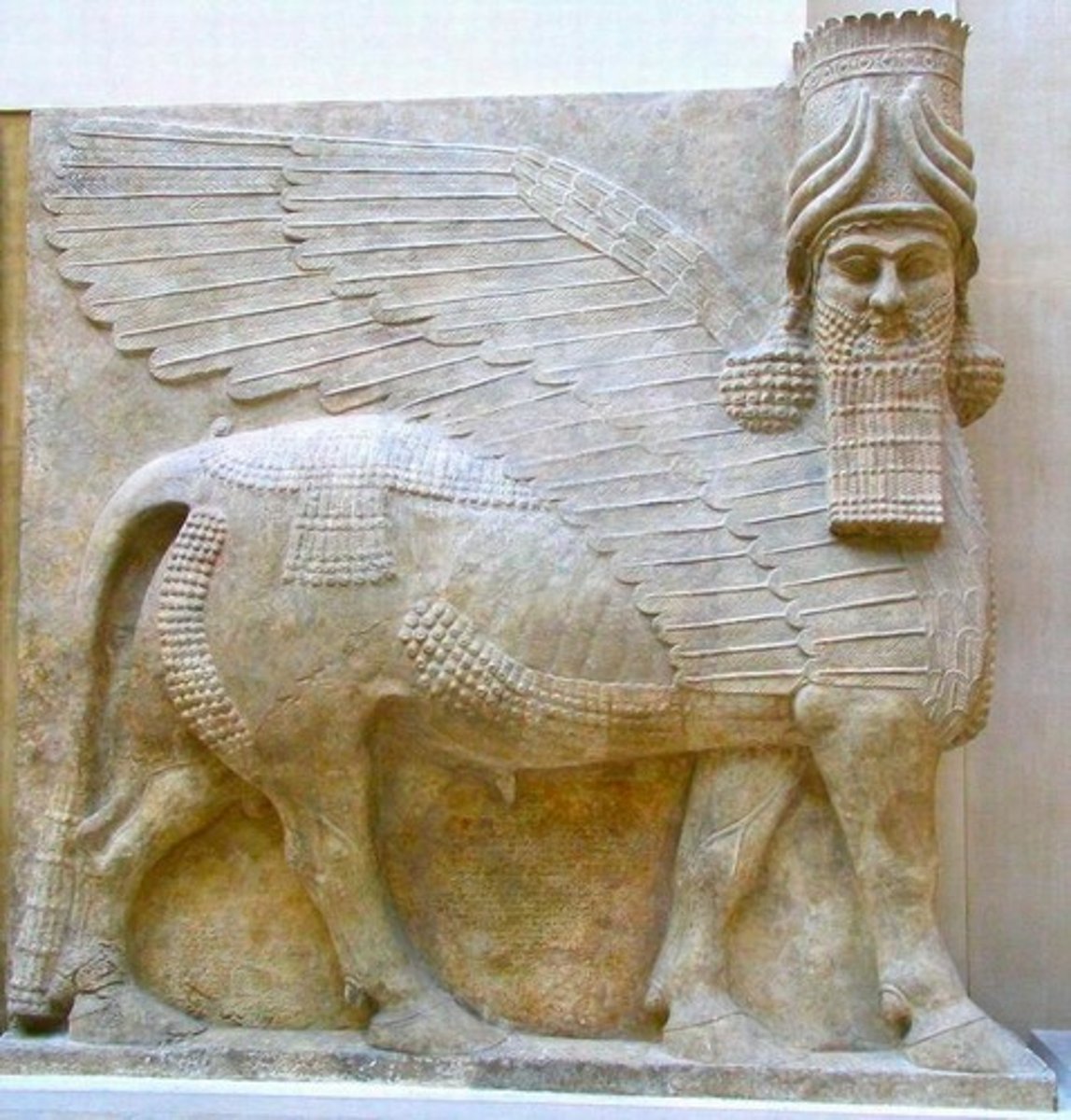
Egyptian sculpture
PERIOD (sculpture):
-colossal outdoor sculptures adorn the dead
-sculptures in bas-relief or incised
Law of frontality
Face must look straight ahead and each side must be exactly like the other, although the hands and feet are in profile; eyes, shoulders in front view
Palette of King Narmer
-used for mixing black eye makeup
-portrayed the victory of upper and lower Egypt
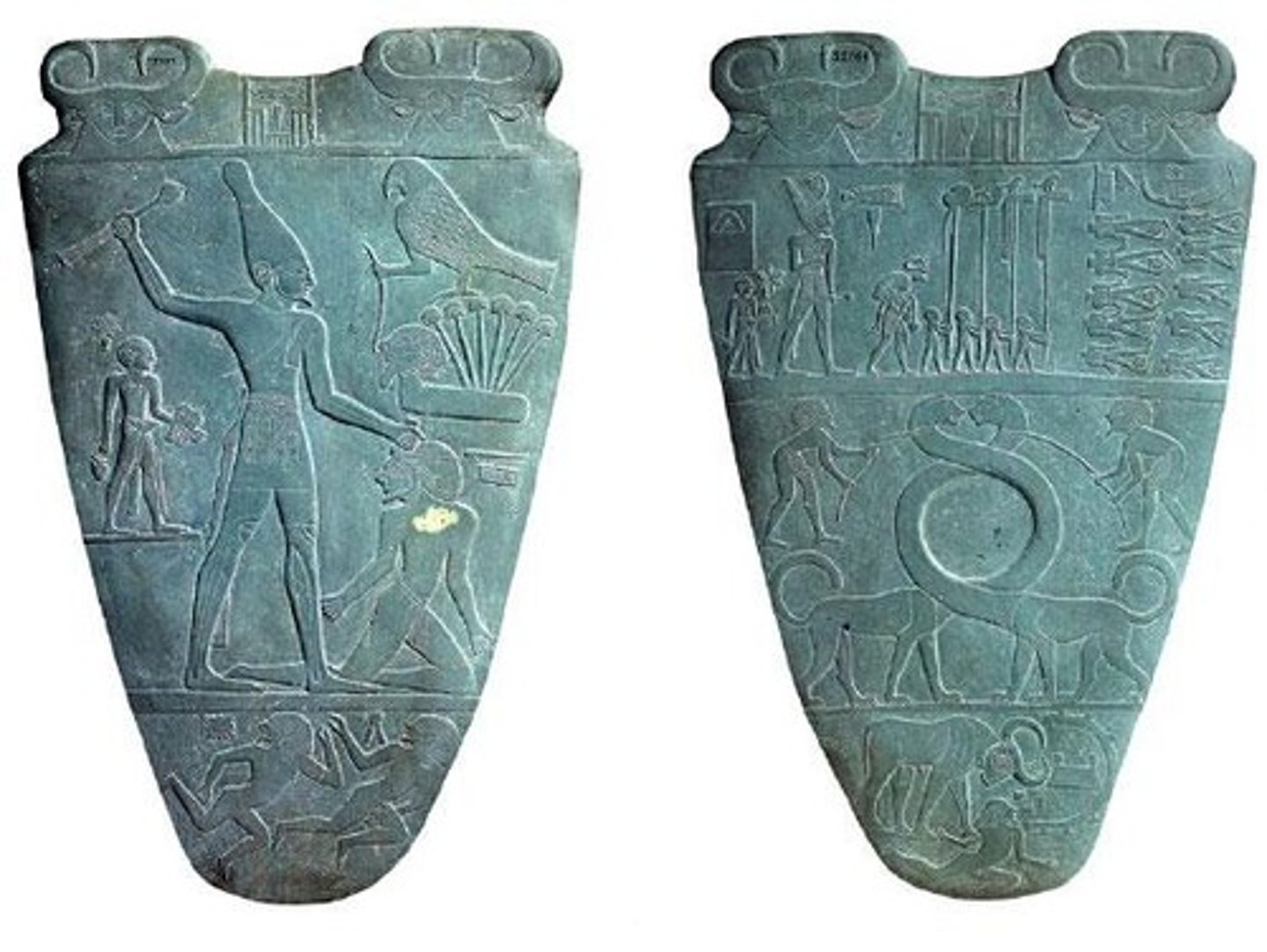
Statues of Pharaoh Akhenaton and Queen Nefertiti
Egyptian sculpture carved from limestone and painted
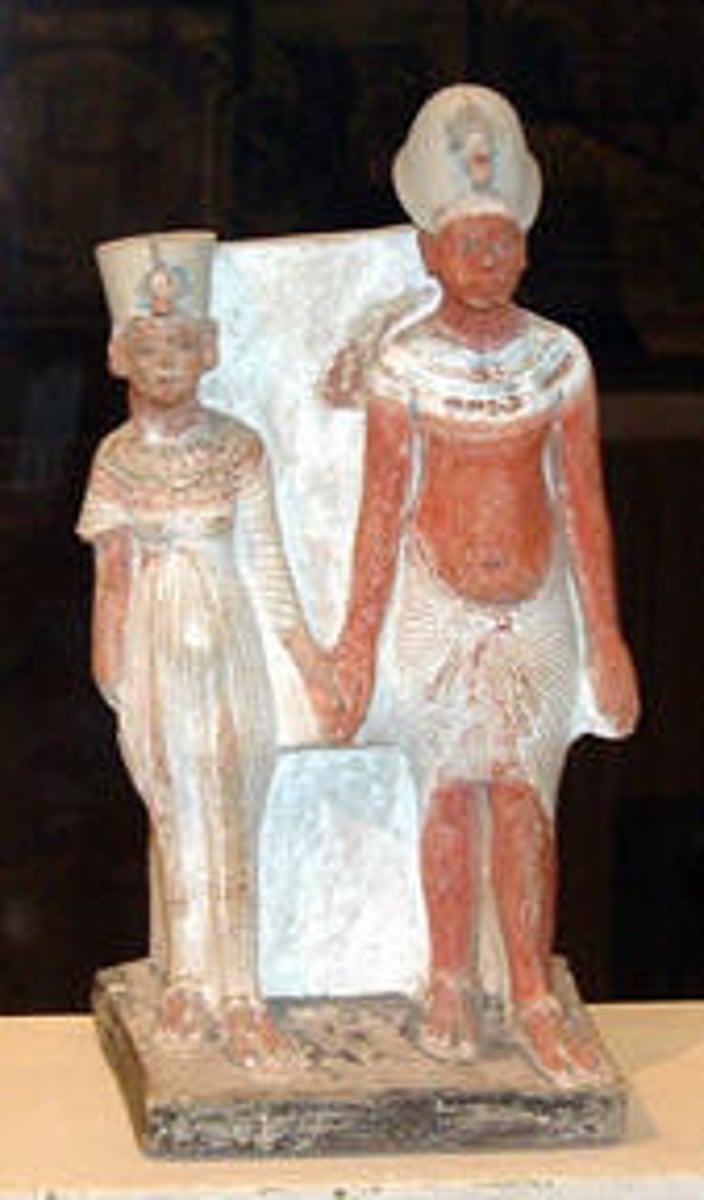
Sphinx
Egyptian statues of deities with head of a man and body of an animal
Cycladic sculpture (Aegean)
PERIOD (sculpture):
-made from marble and depicted the human figure ranging from a few inches to life size
-usually nude females with their arms crossed over
Minoan sculpture (Aegean)
PERIOD (sculpture):
-consists mainly of statuettes and godesses
-most known sculpture is the snake goddess
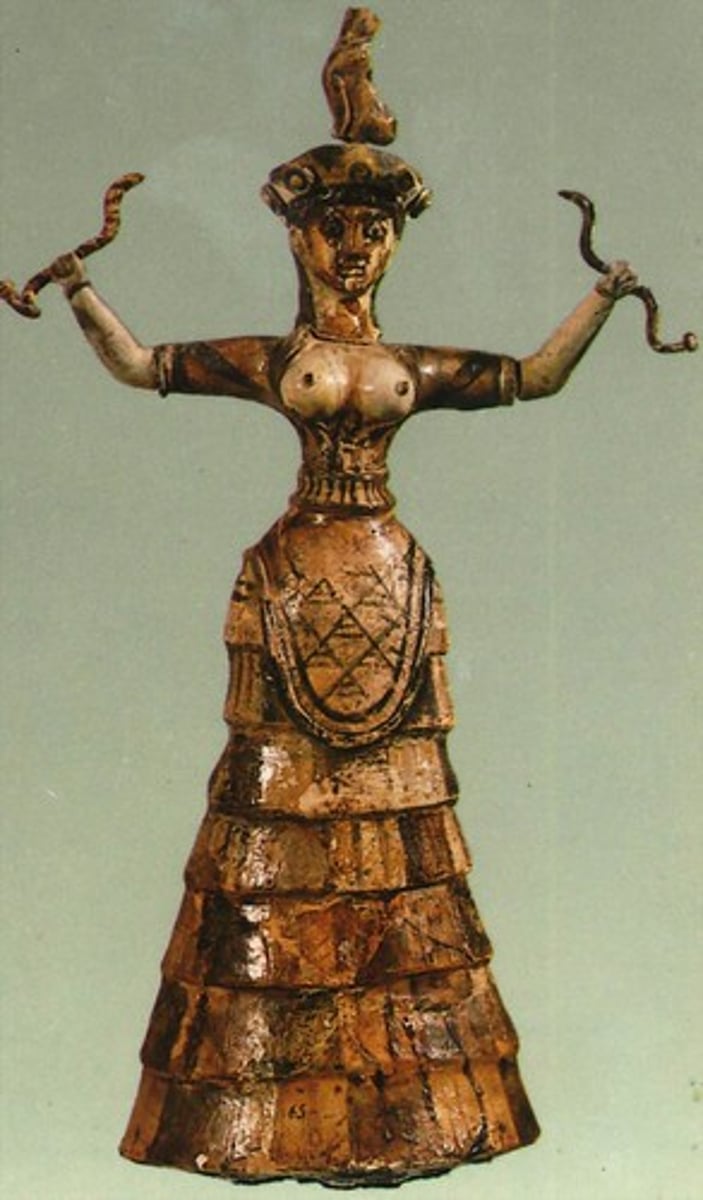
Mycenaean (Aegean)
PERIOD (sculpture):
consisted of small carved ivory deities
Greek
PERIOD (sculpture):
-sculpture was their most favored art
-made monuments to honor gods and commemorate victories, to record religious rites
Daedelic style
clay mold technique mainly for frontal figures; front facing head and triangular in outline and possess long formless bodies
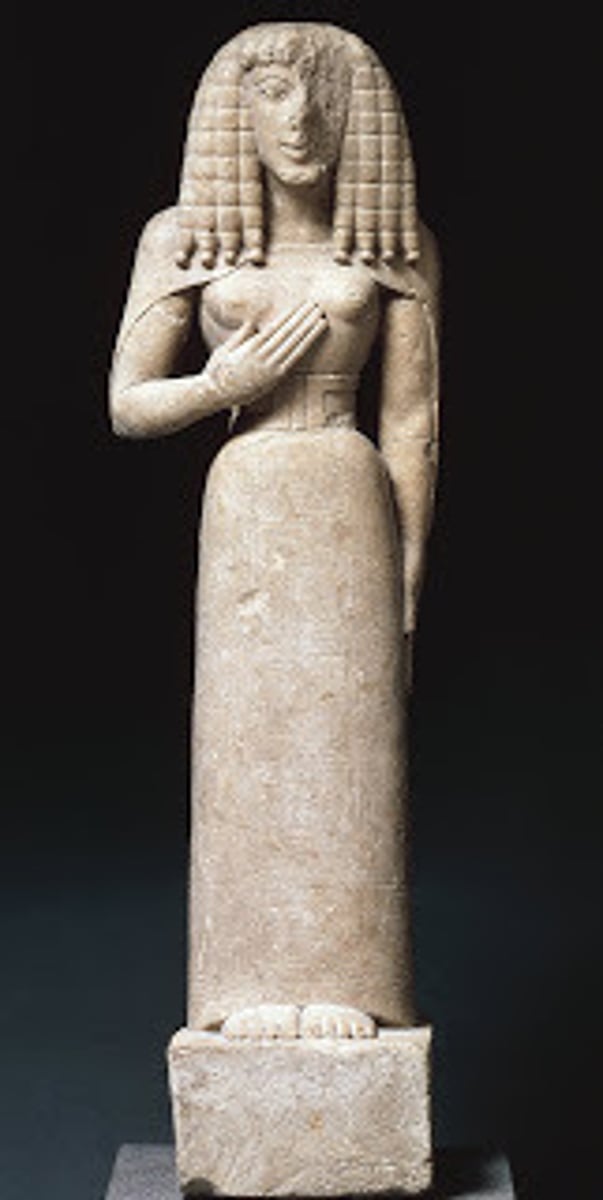
kouros
An Archaic Greek statue of a standing nude male.
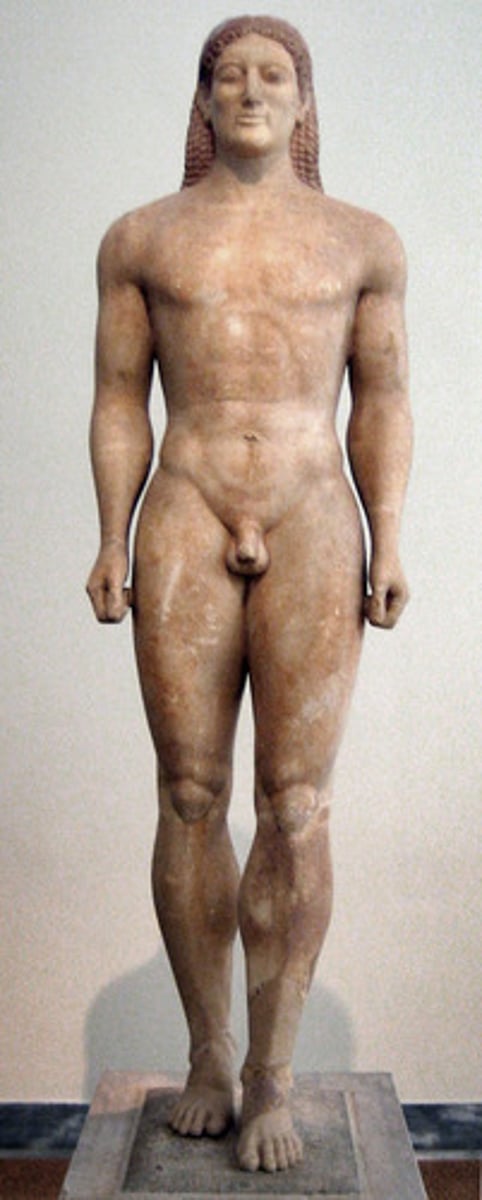
kore
An Archaic Greek statue of a young woman.
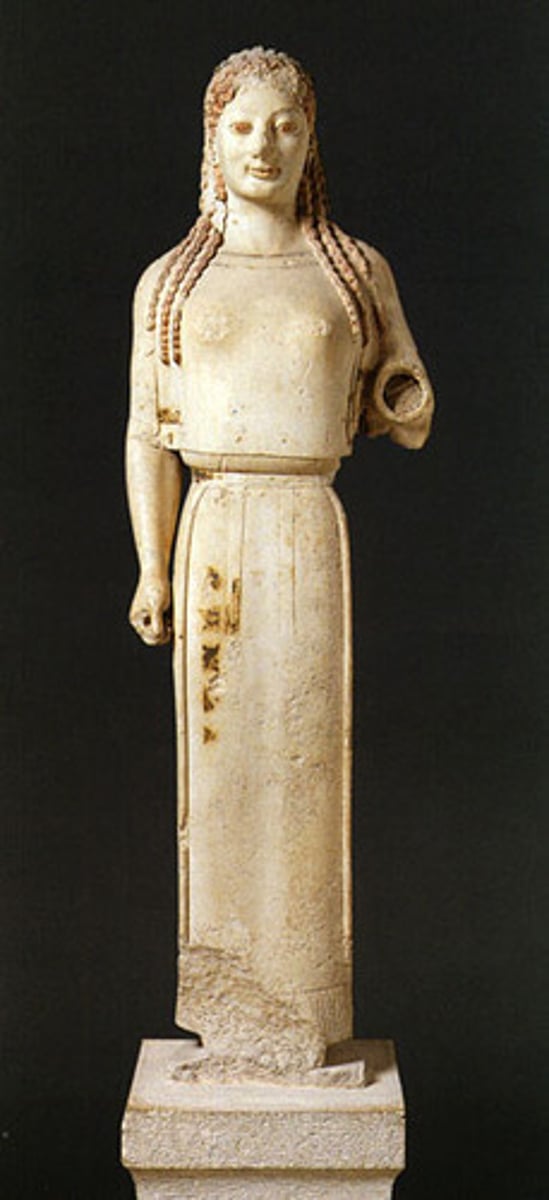
Archaic smile
The smile that appears on all Archaic Greek statues from about 570 to 480 BCE. The smile is the Archaic sculptor's way of indicating that the person portrayed is alive.
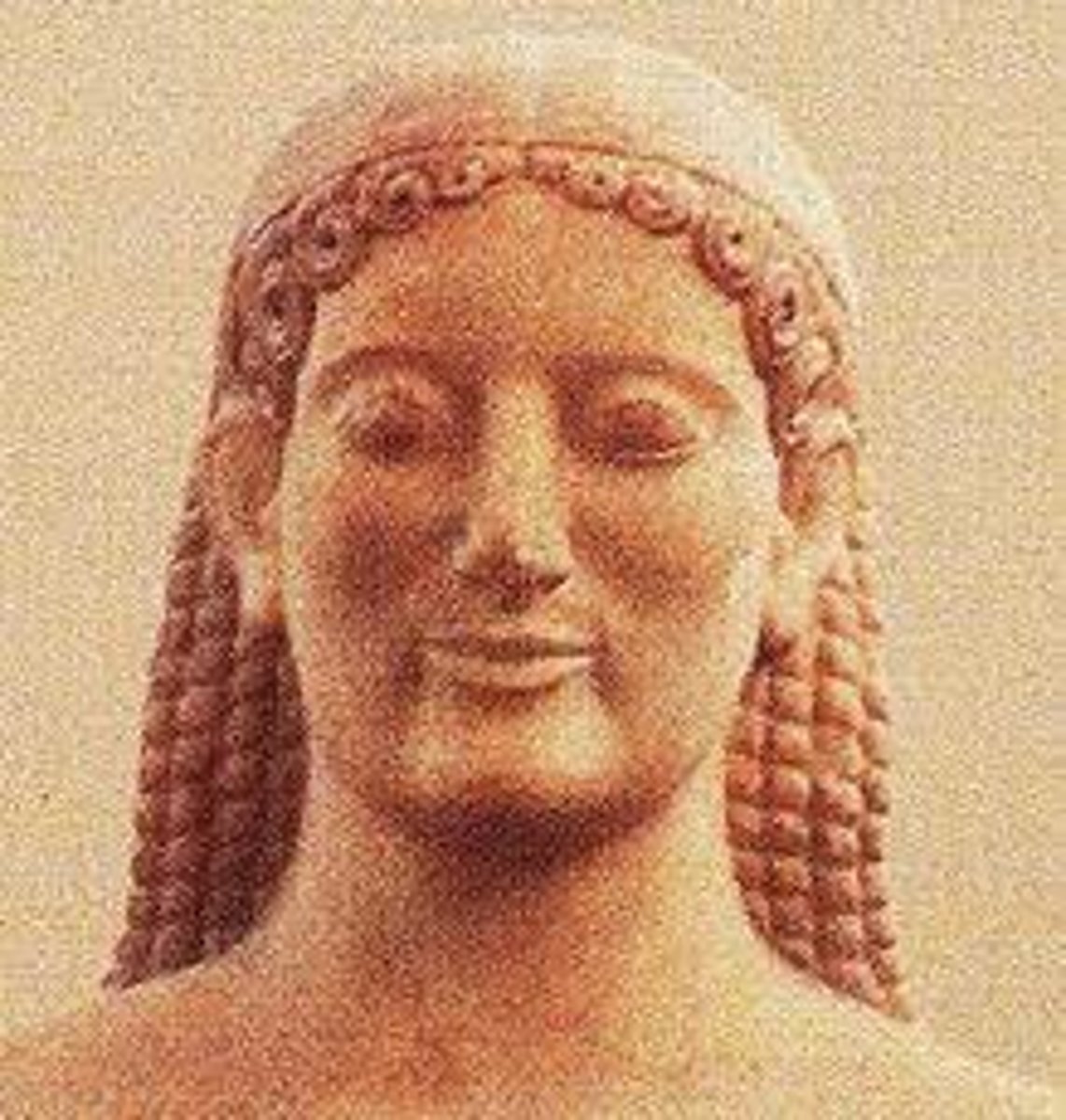
Early Classical Greek
-Severe style
-attempt was to show the body in action or in motion
-Bronze as fav medium
Contrapposto
-knee of the forward leg is lower than the other
-axis of the body is not straight but in a faint like S curve
-weight mainly rests on one leg
Kritios Boy
1st seen use of Contrapposto
High classical greek
greek period which sought to represent the perfect male nude, an ideal which only real men can aspire
Late classical greek
greek period wherein the first great female nude of APhrodite was made
Mausoleum at Halicarnassus
similar to the great pyramids because it was also a burial
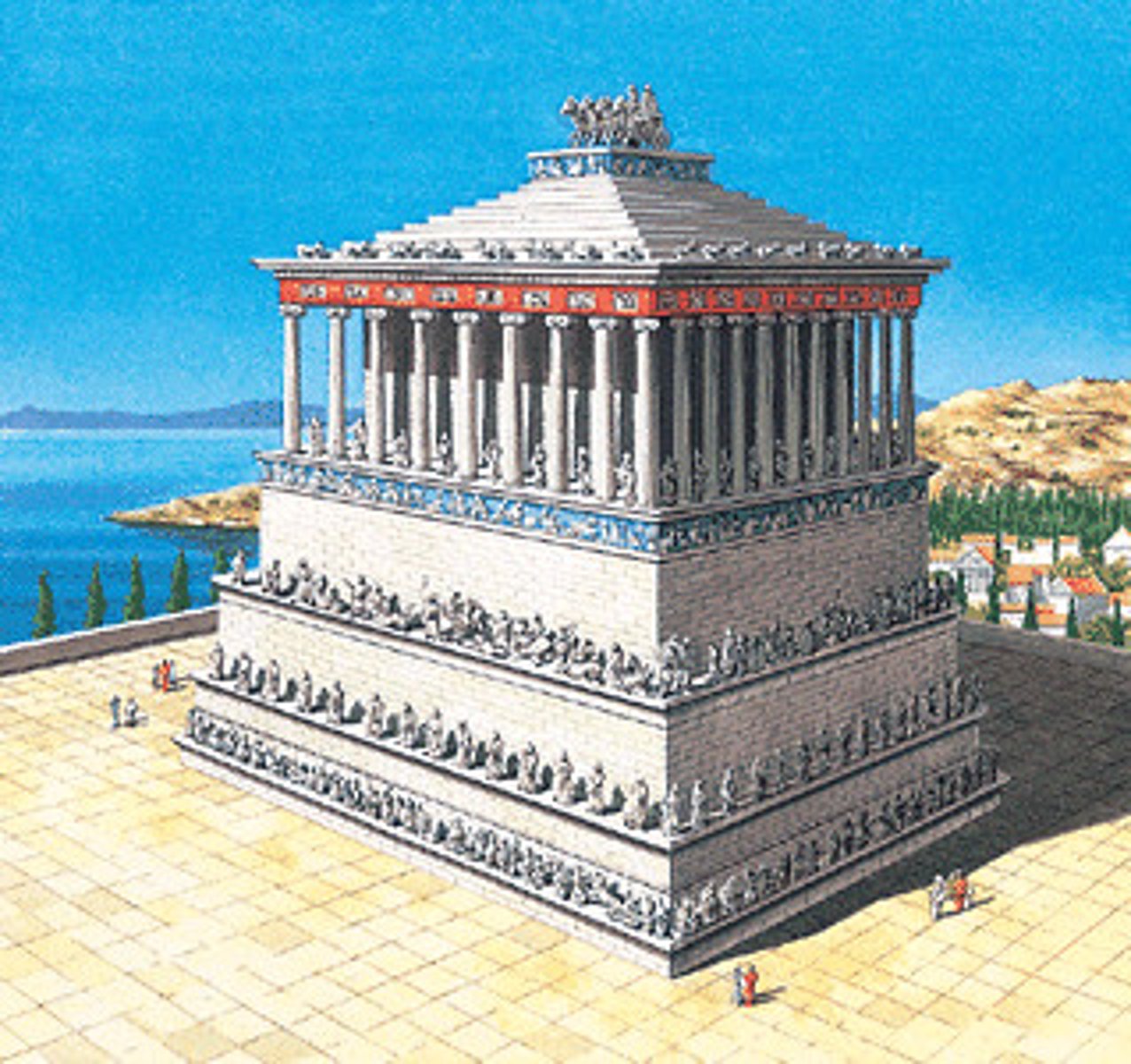
Hellenistic sculpture
PERIOD (sculpture):
was more emotional and realistic than classical Greek sculpture; Greek art lost uch of its simplicity and ideal of perfect form
Venus de Milo
Developed the trend of female nudes
Myron
famous for the boldness of which he fixed moments of violent actions in bronze
WORK: Discobolus
Discobolus
Discus thrower
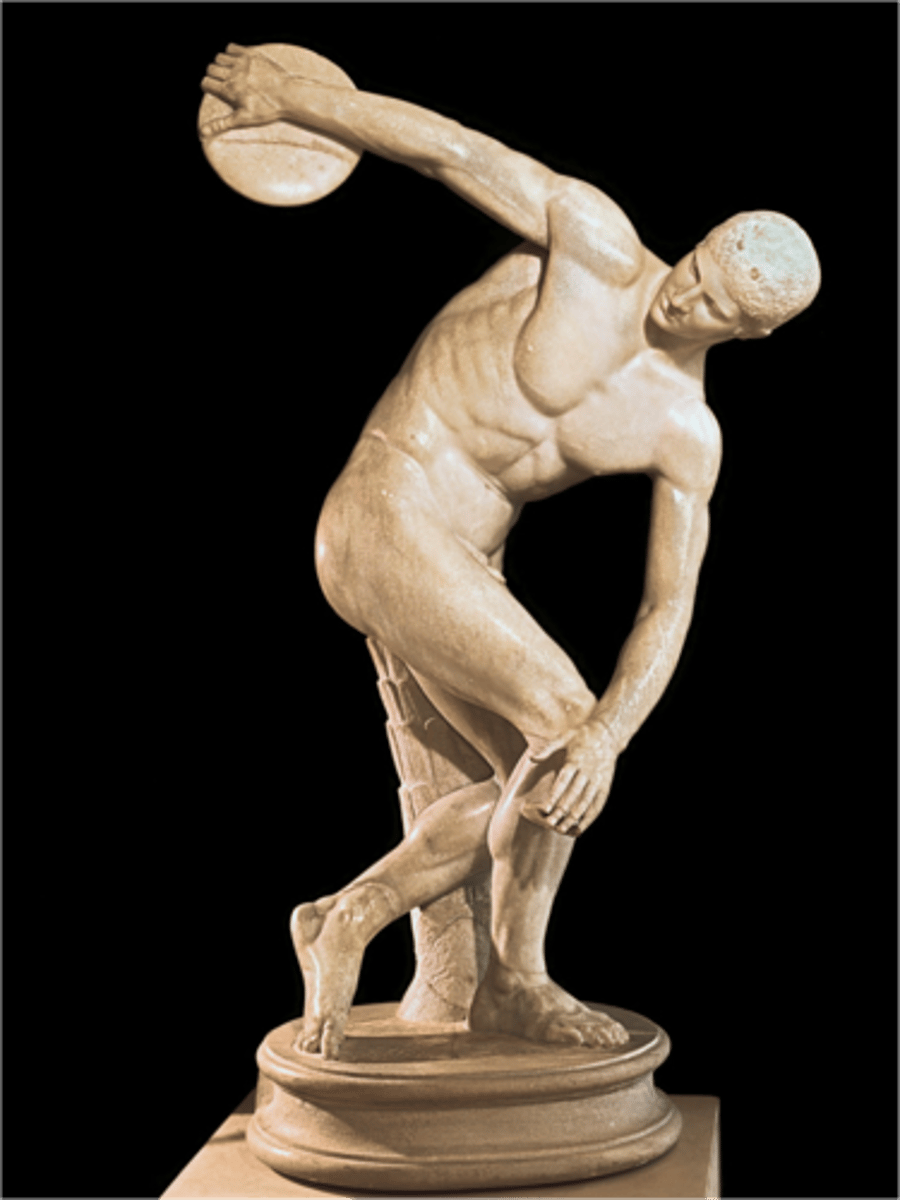
Phidias
greatest sculptor in Greece who designed the Parthenon
Elgin Marble
figures with covered drapery that seems wet
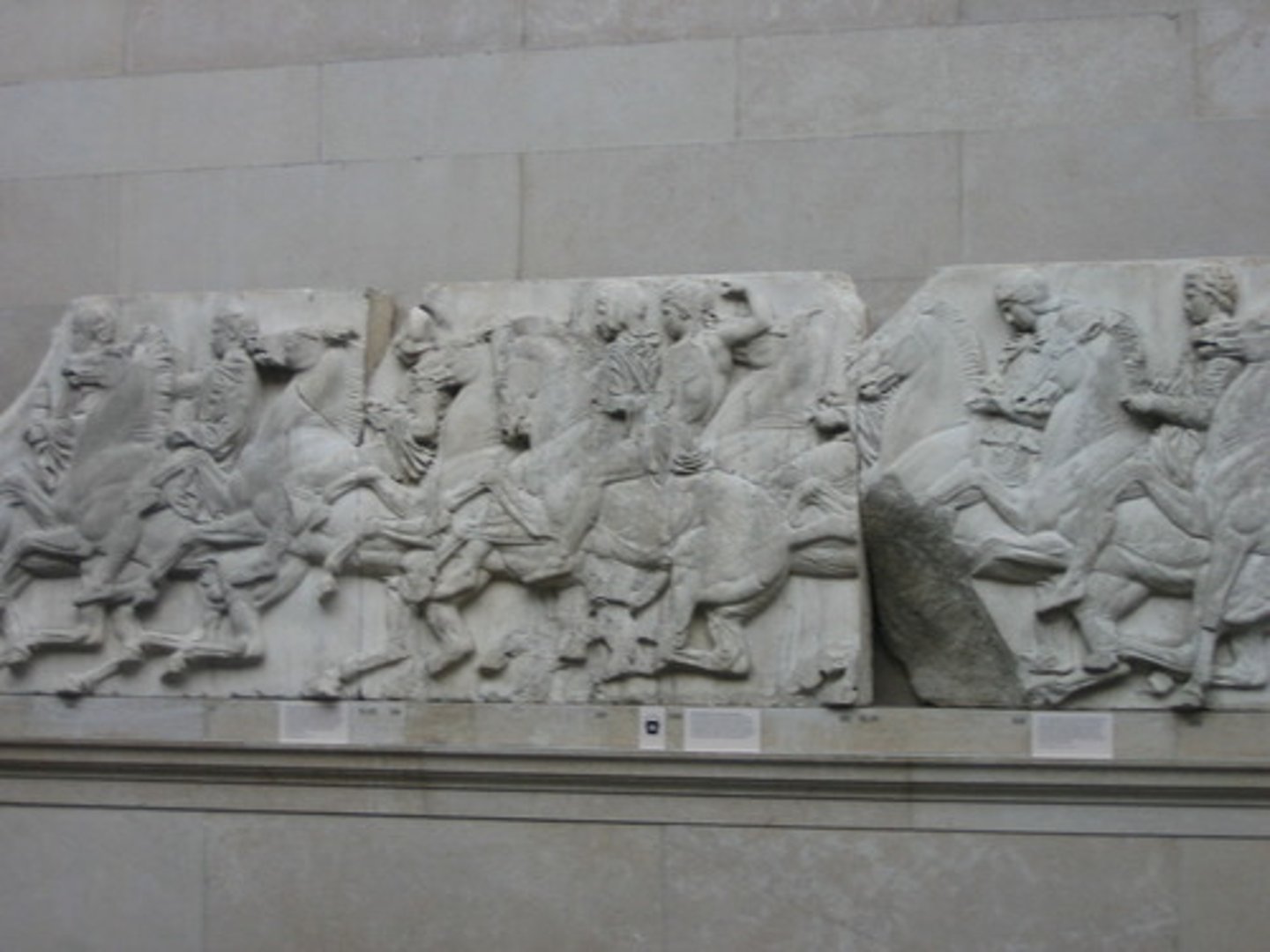
Polycleitus
greek sculptor who aimed to depict people as they were
WORK: Doryphoros
4 fingers = 1 palm
4 palms = 1 foot
4 heads = 1 shoulder
7 heads = ht. of figure
Canon is the use of scale and proportions
4 fingers =
4 palms =
4 heads =
7 heads =
Doryphoros
spear-bearer by Polycleitus
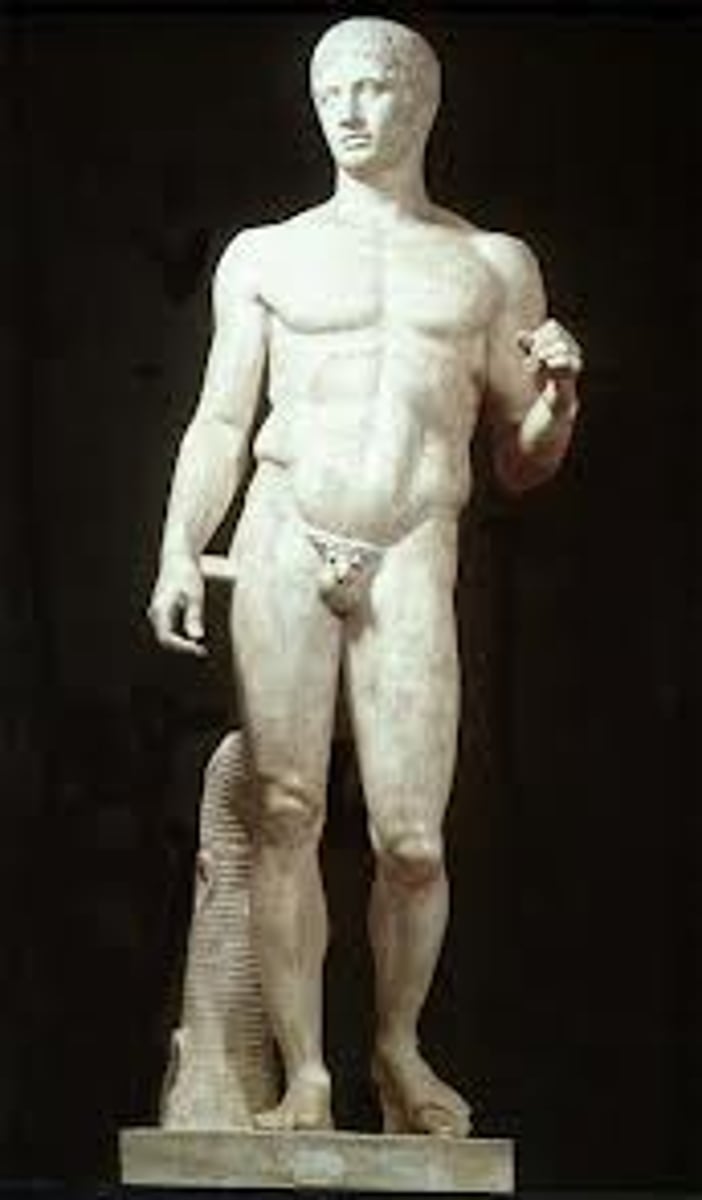
Diadumenos
fillet binder by Polycleitus
Praxiteles
Ancient Greek sculptor (circa 370-330 BC), a sculptor who lived after Phidias who sculpted figures that "ripple with life" and natural in form and size.
WORK: Aphrodite of Cnidus
Praxitelian curve
Exhibiting exaggerated contrapposto. Sensuous modeling of the body with a serene unmistakable gaze
Aphrodite of Cynidus
1st great female nude of a goddess of beauty; by Praxiteles
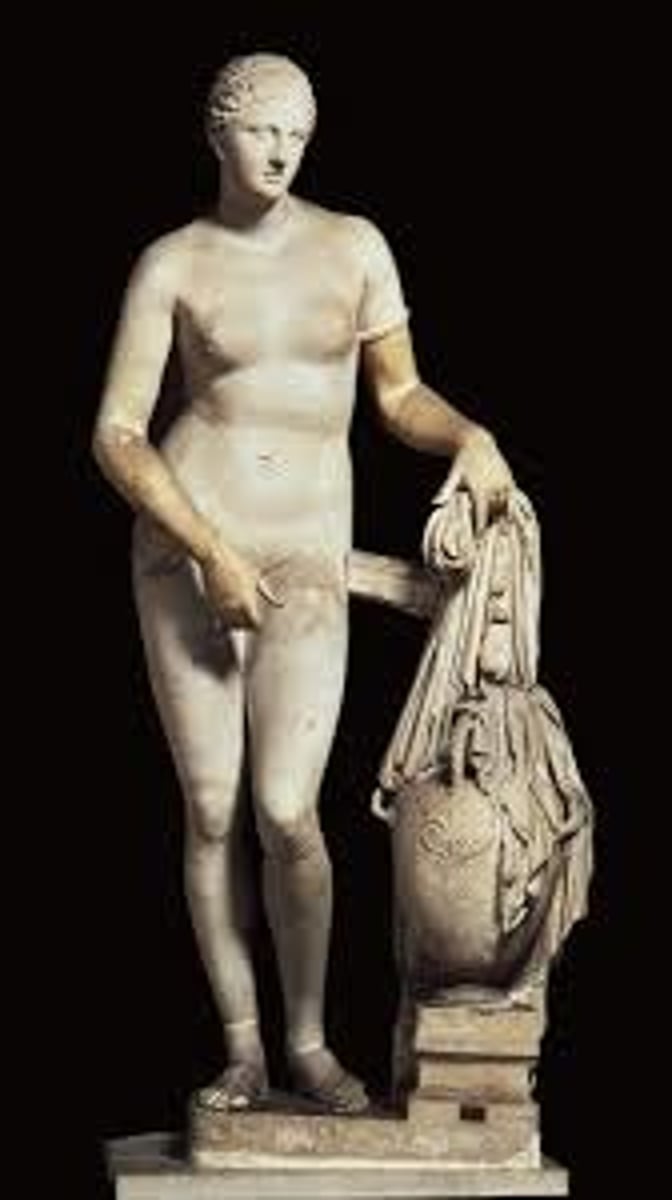
Lysippus
Alexander the Great's personal sculptor, created stock representation of god-like Alexander, with tousled hair and eyes looking upward; modified the canon by using SMALLER HEADS for his figures
Work: Hercules; Apoxyomenos
Negative relief
A technique of undercutting with a drill around the figure rather than modeling them in rounded form producing a flattering contrast of light and shadow.
Lost wax process
A bronze-casting method in which a figure is modeled in wax and covered with clay; the whole is fired, melting away the wax (French, cire perdue) and hardening the clay, which then becomes a mold for molten metal.
Roman sculpture
PERIOD (sculpture):
had 4 types of sculpture
relief, funeral reliefs, free-standing sculpture, portrait sculpture
Ara Pacis
'Altar of Peace'; built to honor the peace established by Augustus; contains carved depictions of Roman civil religion
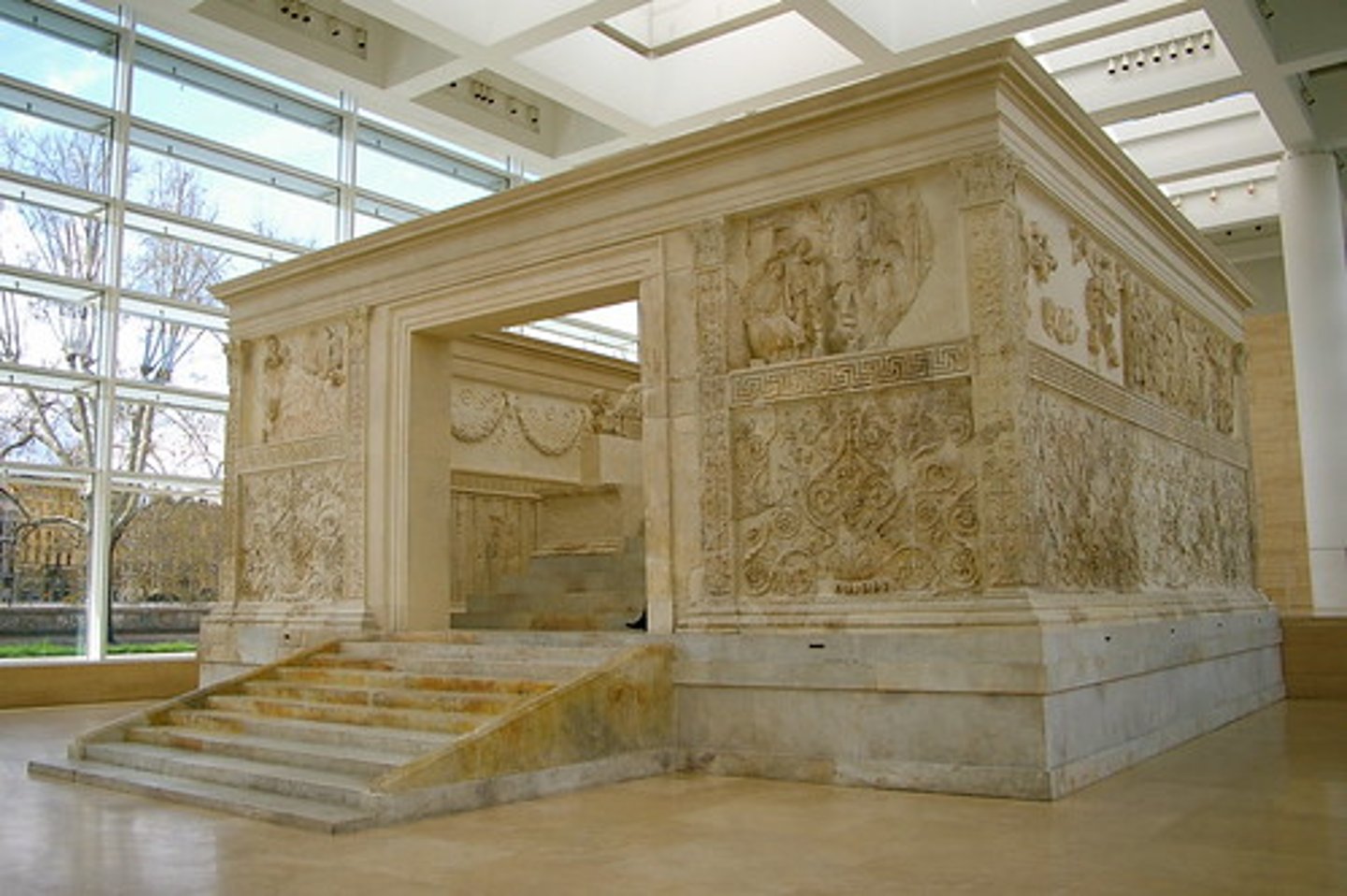
Trajan's Column
a Roman triumphal column in Rome, Italy, that commemorates Roman emperor Trajan's victory in the Dacian Wars.
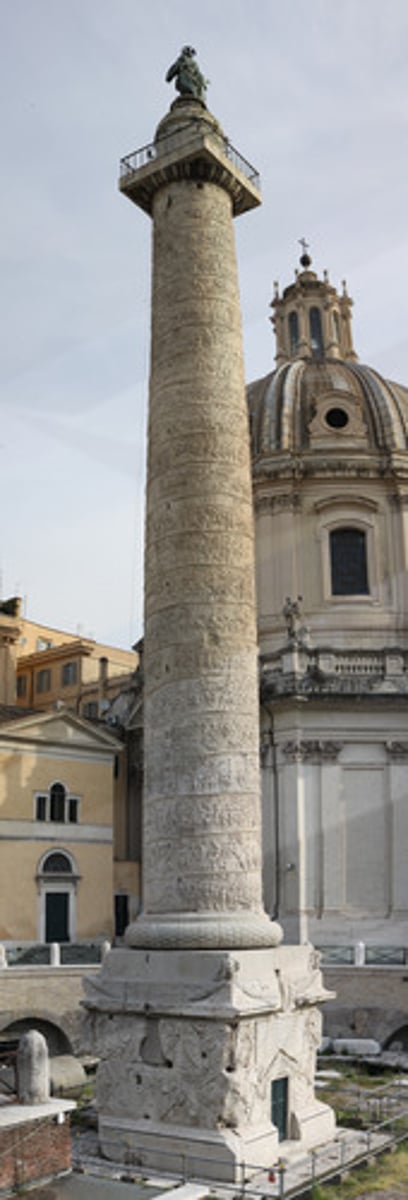
Sarcophagus of Junius Bassus
Early Christian sculpture w/ 10 biblical scenes
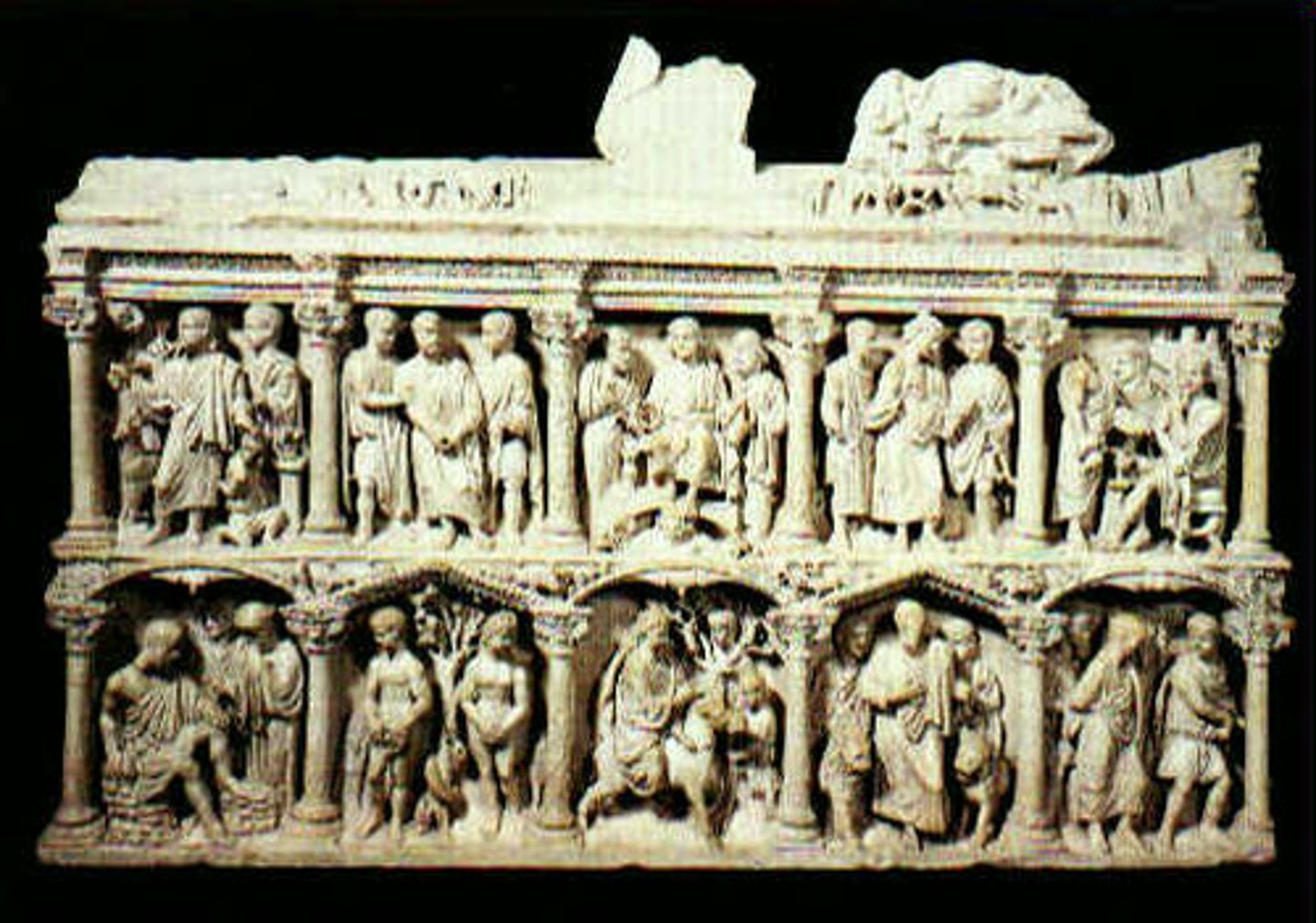
Byzantine sculpture
PERIOD (sculpture):
period of Iconography and Iconoclasm; marble capitals are carved with surprising delicacy with purely oriental or highly stylized vine scrolls and animals
Iconoclasm
Removal of all religious images from churches and monasteries during a period in the Byzantine Empire, replacing it with a CROSS
Romanesque sculpture
PERIOD (sculpture):
carved in reliefs used in tympanums and portals; developed elaborate crosses 6 ft high
High Gothic period
PERIOD (sculpture):
sculpture still attached to columns but stand on their own right on horizontal pedestals; proportions are ideally perfect; deeper meaning with religious figures
Late Gothic period
PERIOD (sculpture):
give more emphasis to individual free standing or altar pieces. They float than stand on the pedestals and were more REALISTIC.
Nicola Pisano
sculptor during the Gothic period who had classical leanings, continued the Italian tradition of elaborate freestanding carved PULPITS, managed CROWDED figures, merged into broad narrative panels
WORK: Presentation in the Temple
Giovanni Pisano
Gothic sculptor; dramatic departure from father's style; emotion more contrast and realism; attention to drapery folds; "Nativity"; developed free standing sculptures in wood, ivory, and marble
WORK: the Crucifixion
Renaissance sculpture
PERIOD (sculpture):
-full range of human emotions and character
-exact knowledge of anatomy and body mechanics, prespective, and dynamics
Leon Battista Alberti
italian humanist author and architect who focused on the use of "perfect forms"; gave practical and theoretical lead to painters and sculptors
Lorenzo Ghiberti
painted the Gates of Paradise which showed 10 scenes from the New Testament
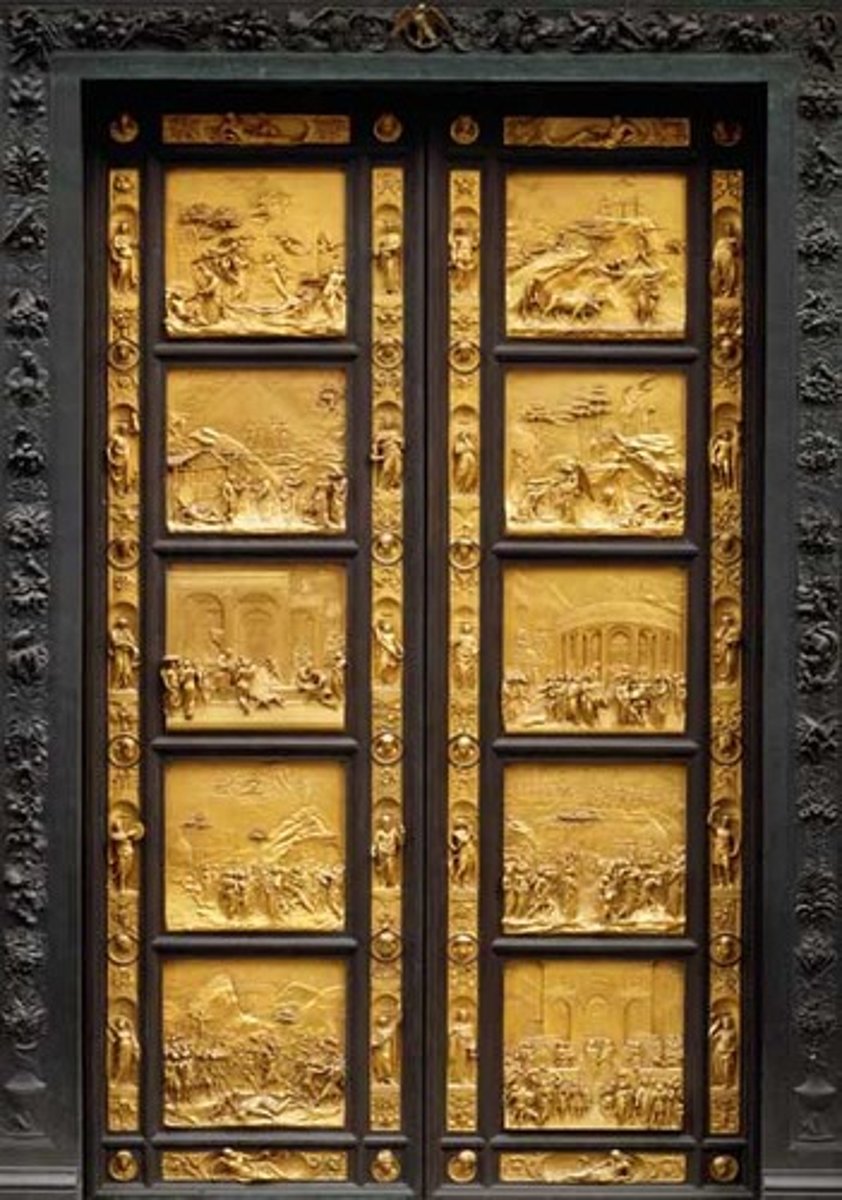
Jacobo della Quercia
noteworthy artist of Florence
-Early Renaissance; understood human psychology
Donatello
Greatest sculptor of Early Renaissance; master stone cutter; profound understanding of human psychology
WORK: Bronze David
Bronze David
by Donatello; 1st major work of Renaissance sculpture; 1st free standing nude statue
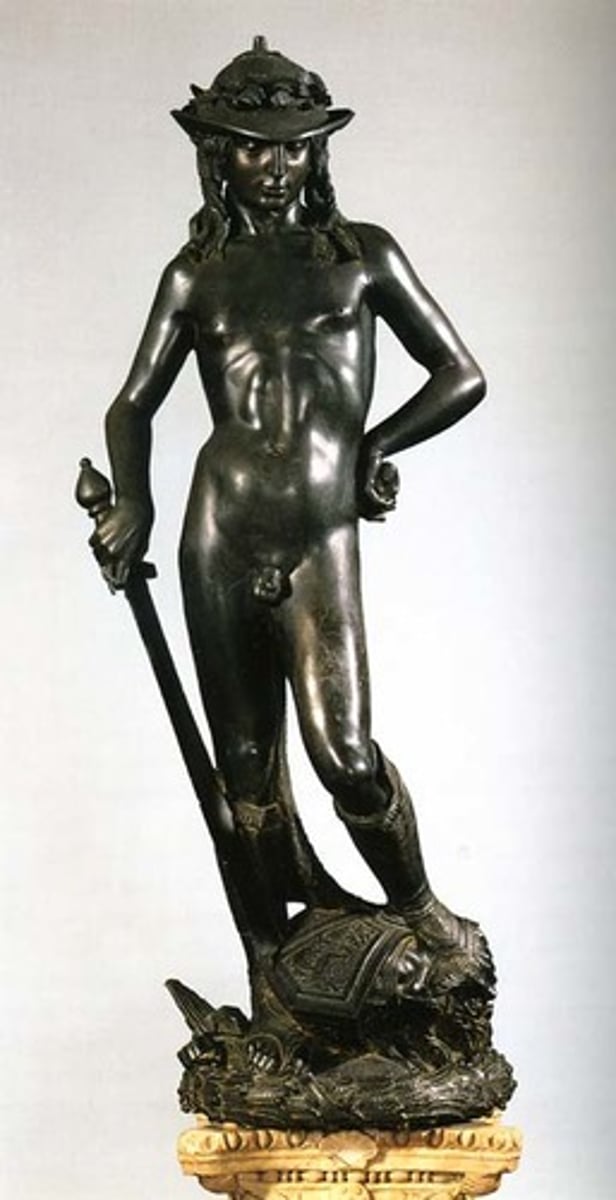
Andrea de Vorrochio
Influential Florentine sculptor, goldsmith, and painter
WORK: David which is under-age and CLOTHED compared to Donatello's
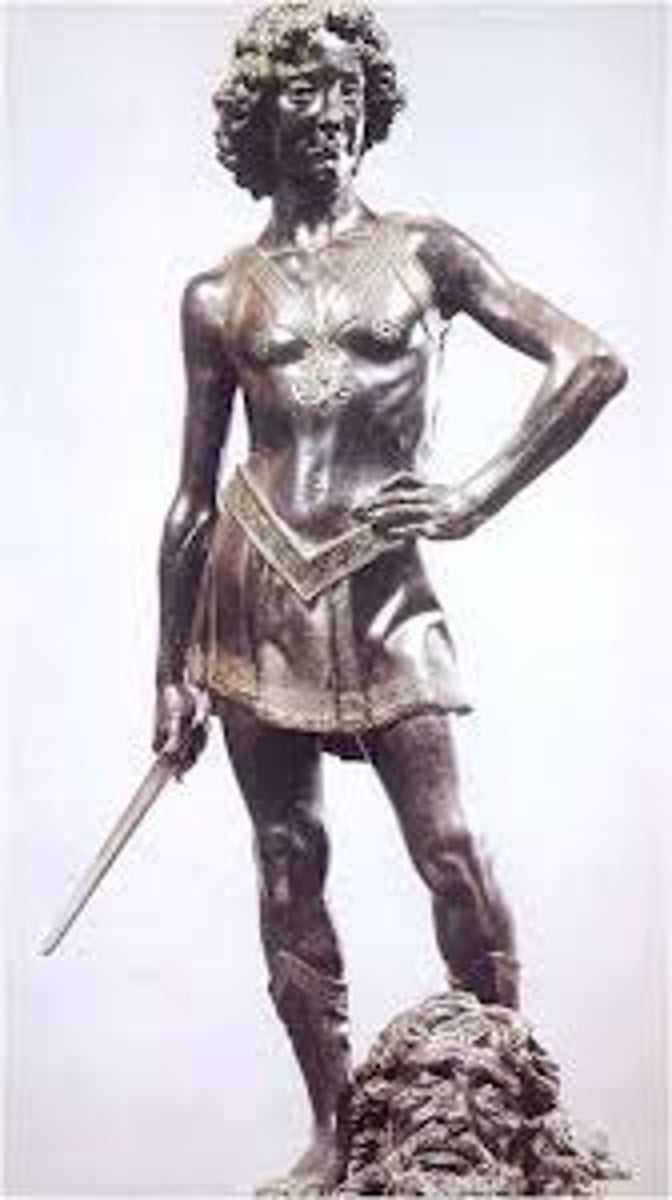
Michelangelo
-Il Divino or the Divine One
-towering genius in sculpting
-created influential fresco paintings
WORKS: Sistine Chapel frescoes, Pieta and David

pieta
by Michelangelo; 1st to do realistic drapery folds on marble
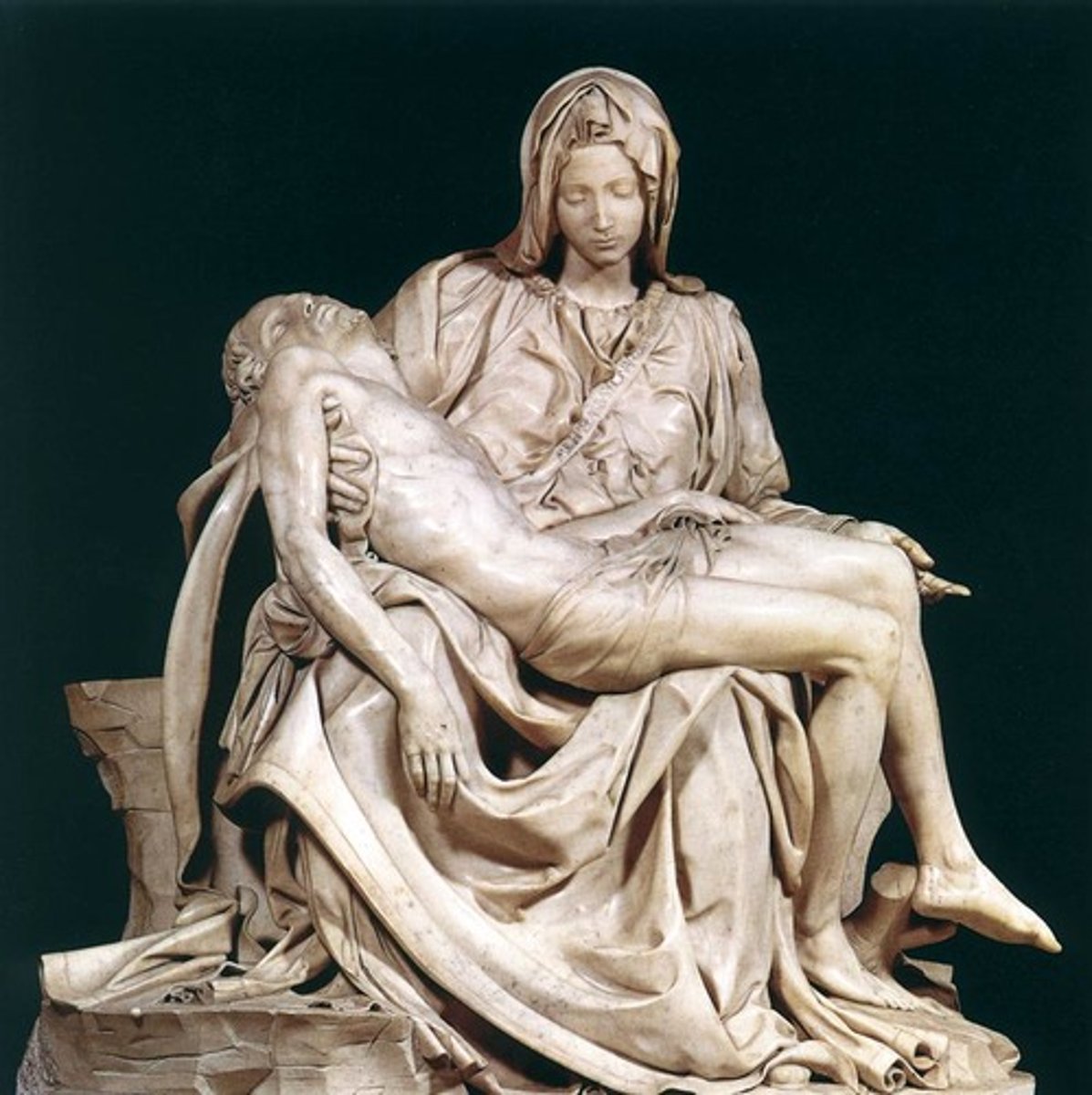
David
by Michelangelo; before the battle, shows tension with face and his only weapon was his intelligence
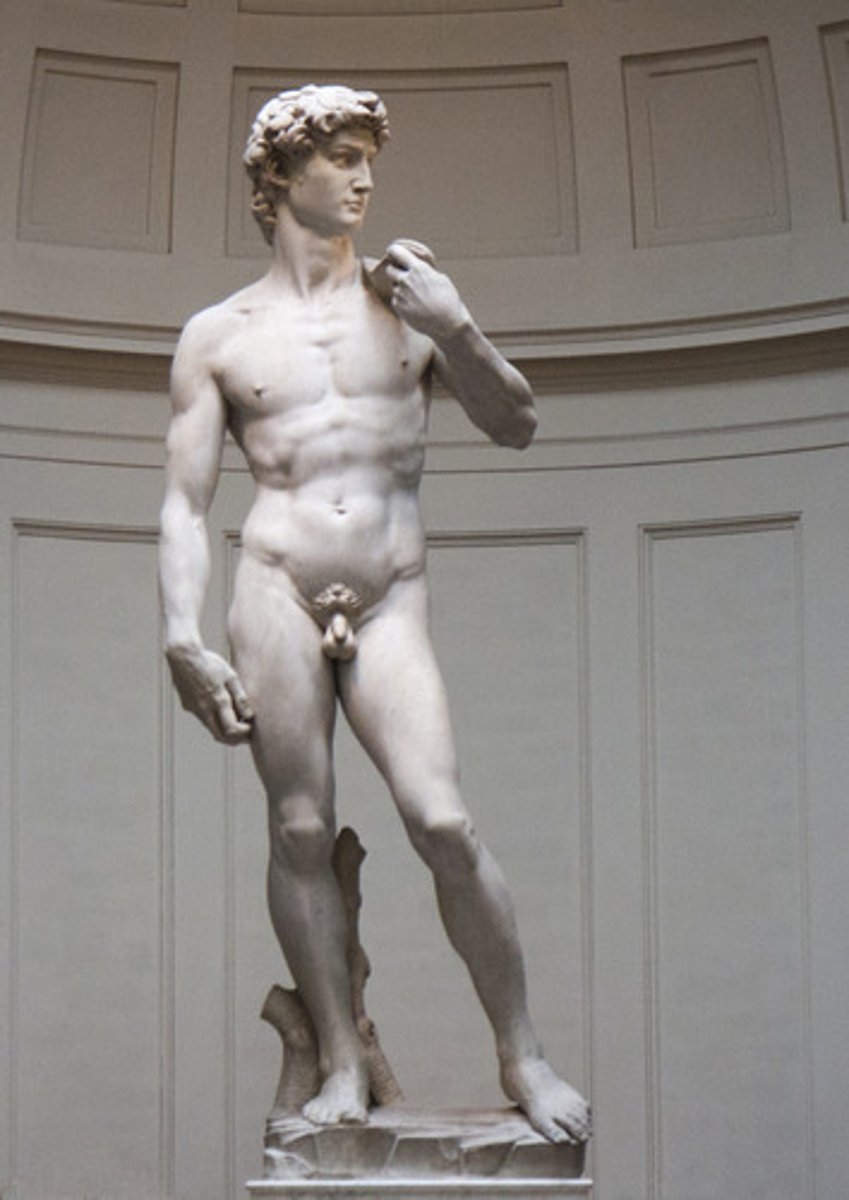
Mannerist sculpture
PERIOD (sculpture):
focus on human form, depiction in intricate poses and exagerrated realistic settings
Benvenuto Cellini
-known for his terrible character and banned from Florence for a time
WORK: Perseus holding Medusa's head
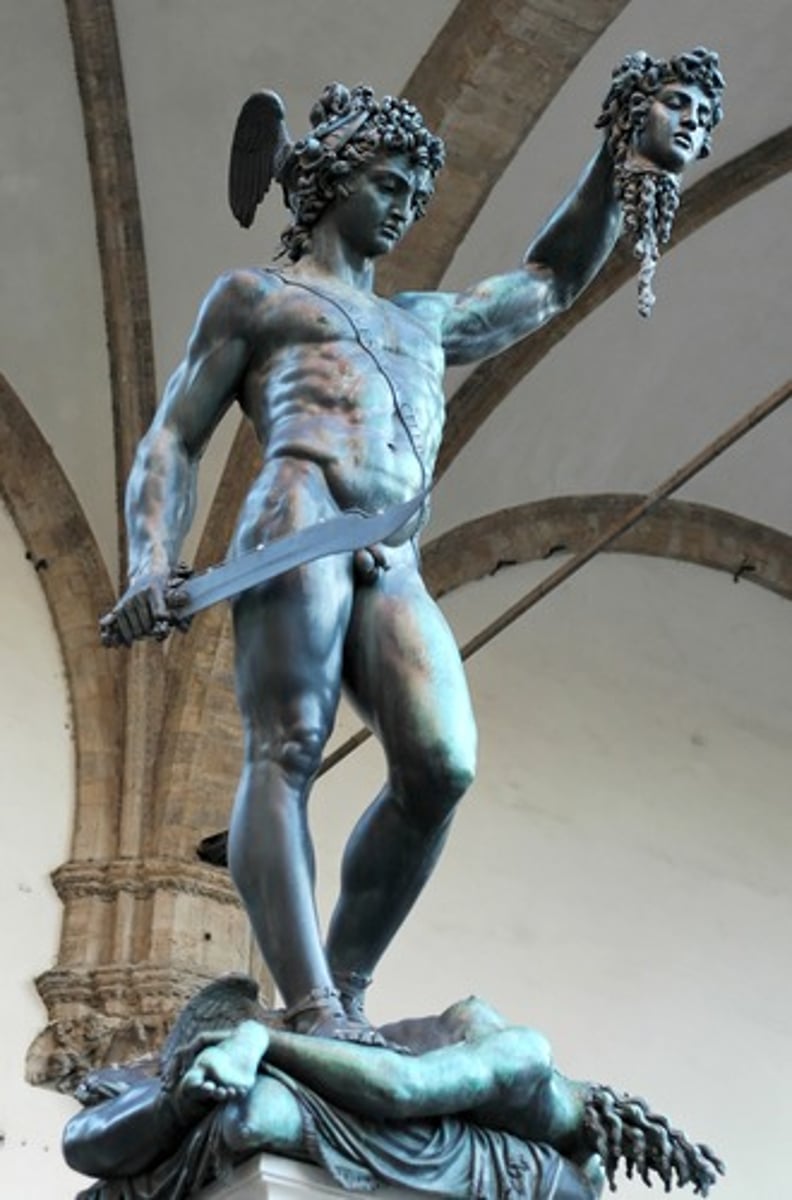
Giambologna (Giovanni de Bologna)
-created own personal style and carefully studied FORMALISM with refined and dynamically balanced figures
-creation of FOUNTAINS
WORK: Mercury; rape of the Sabine woman
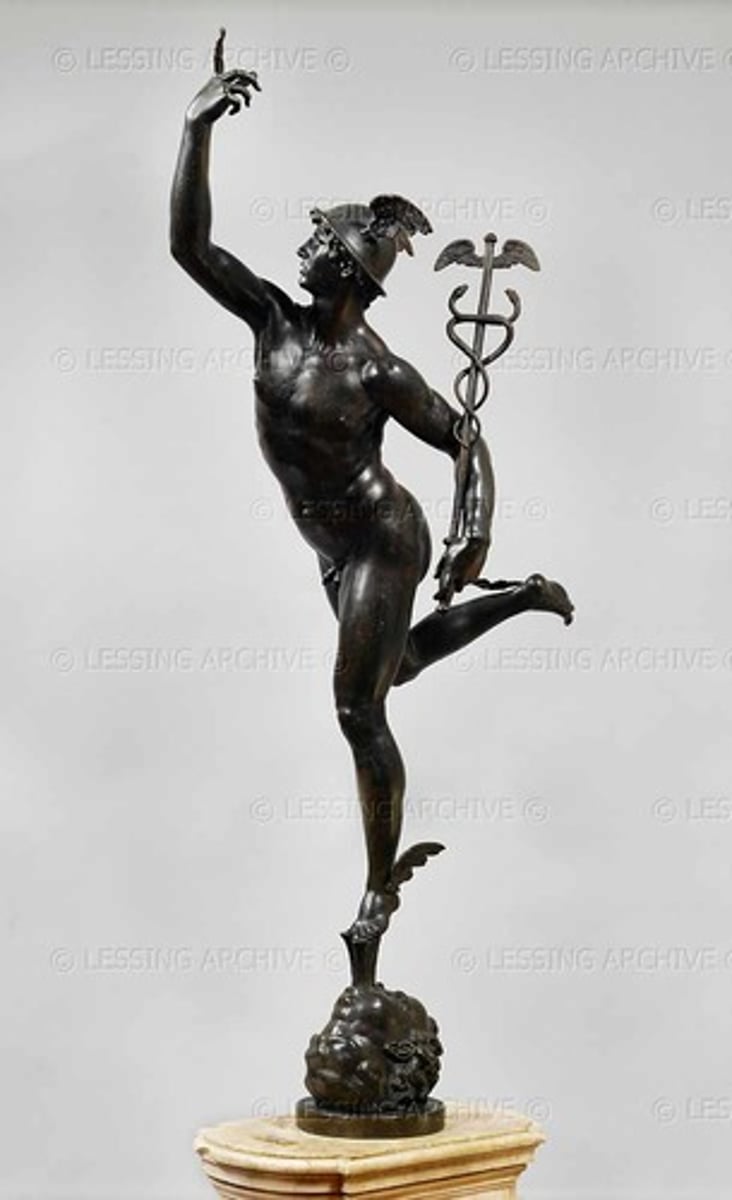
rape of the Sabine woman
by Giovanni de Bologna; 1st twisting spiraling sculpture; no definite front or back
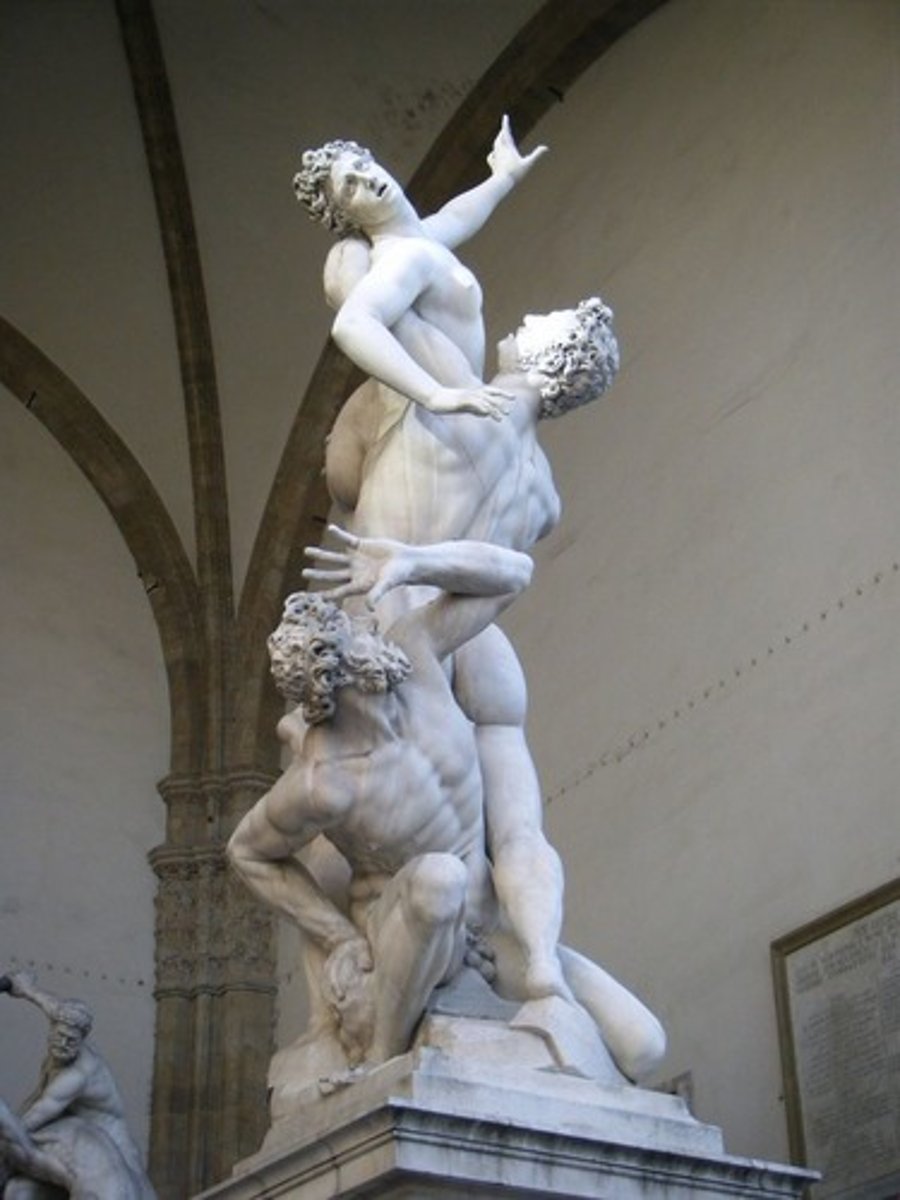
Baroque sculpture
PERIOD (sculpture):
fugures moved, flew or contorted with agony
-abundant drapery folds were swept by the wind
Giovanni Lorenzo Bernini
strong interplay of light, shadow and movement characterizes his works and he was typified by the use of illusion, excitement and spectacular effects.
WORK: Ecstasy of Teresa, Cathedra Petri, moving David
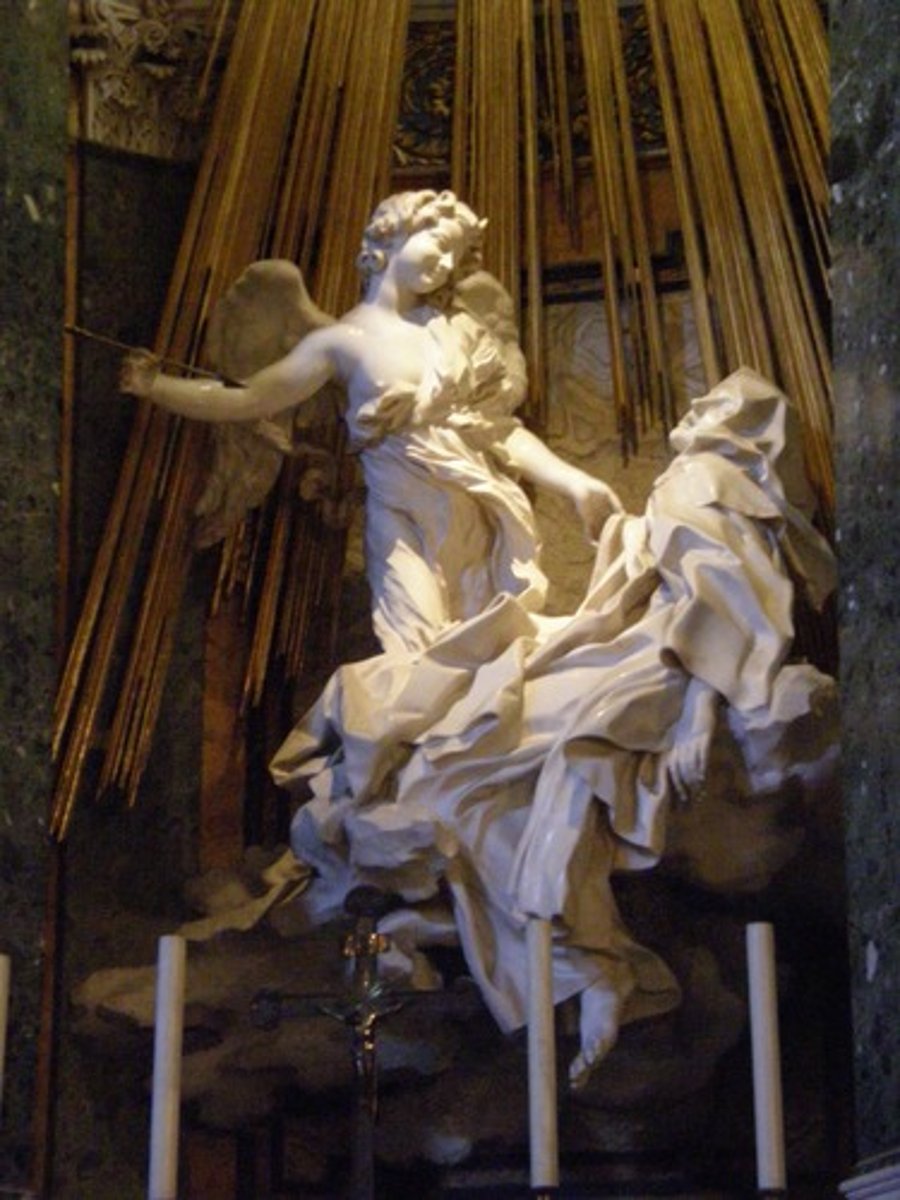
Giovanni Lorenzo Bernini
created a moving David about to throw the stone
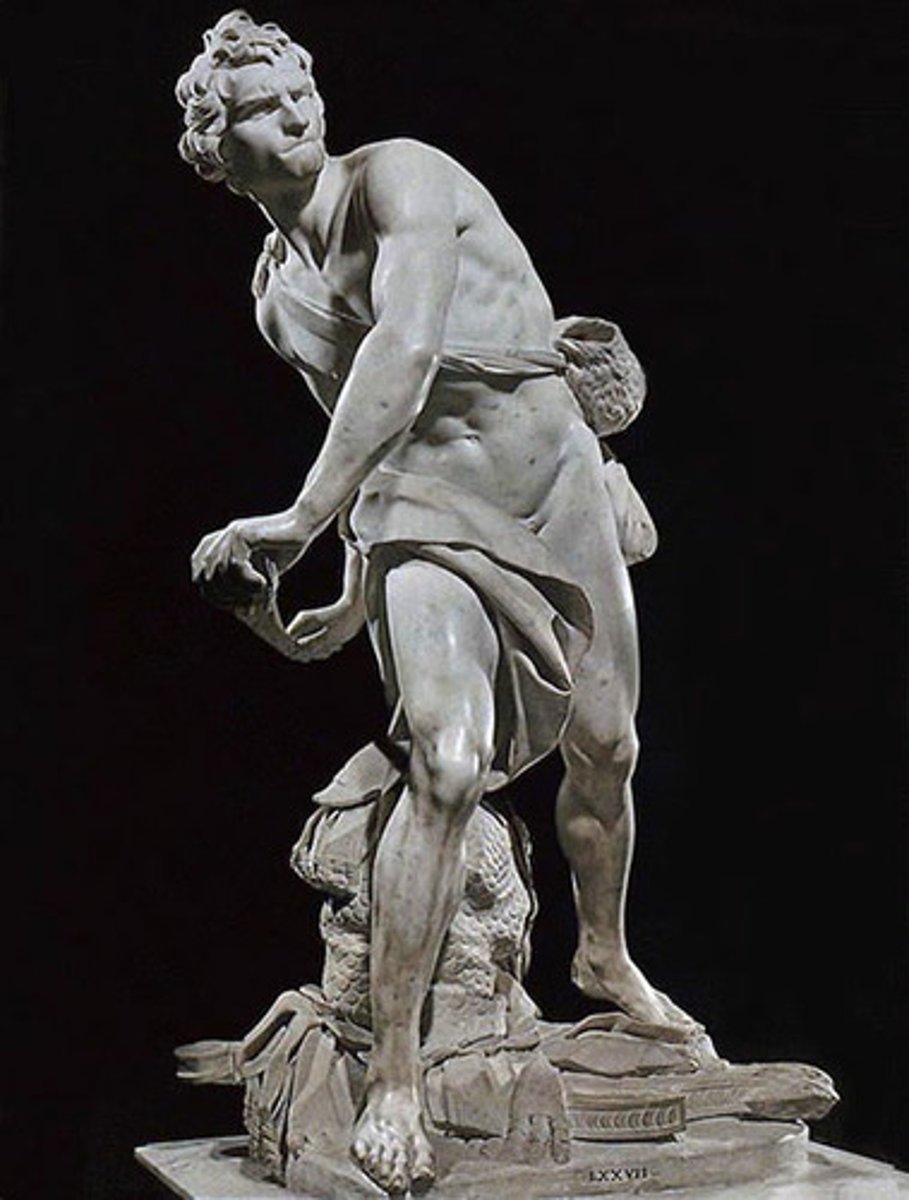
Rococo sculpture
PERIOD (sculpture):
parallel movement away from the grandeur of baroque; SMALL-SCALE
Clodion (Claude Michel)
greatest Rococo sculptor; Worked w/ terra cotta. Subjects were nymphs, satyrs, bacchantes, and other sensual figures
WORK: relief in Arc de Triomphe; Nymph and Satyr Carousing
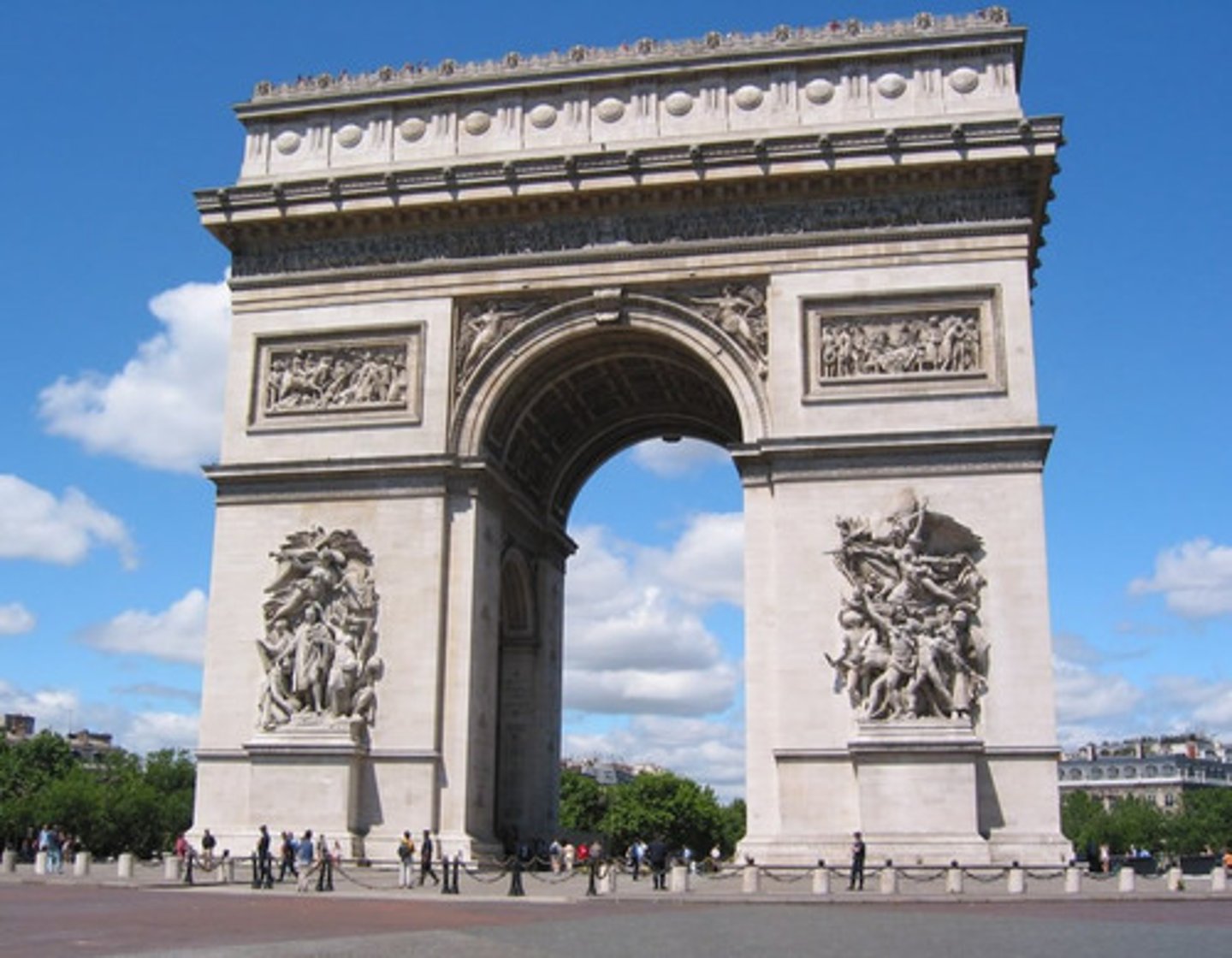
Etienne Maurice Falconet
-director at Sevres Porcelain Factory
-ironic sculptor; forte was erotic figures
WORK: the bather
Neoclassic Sculpture
PERIOD (sculpture):
noble simplicity and serene grandeur
Antonio Canova
Greatest Italian Sculptor. Famous for his marble sculptures and delicately rendered nude flesh
WORKS: Theseus and Minotaur, Cupid and Psyche
Hilaire Germaine Edgar Degas
French Painter; Most famous works consisted of ballet dances with tutu, women bathing and racehorses.
Just like in his paintings. he aimed to catch the ACTION of the movement
WORK: little 14 yr old dancer
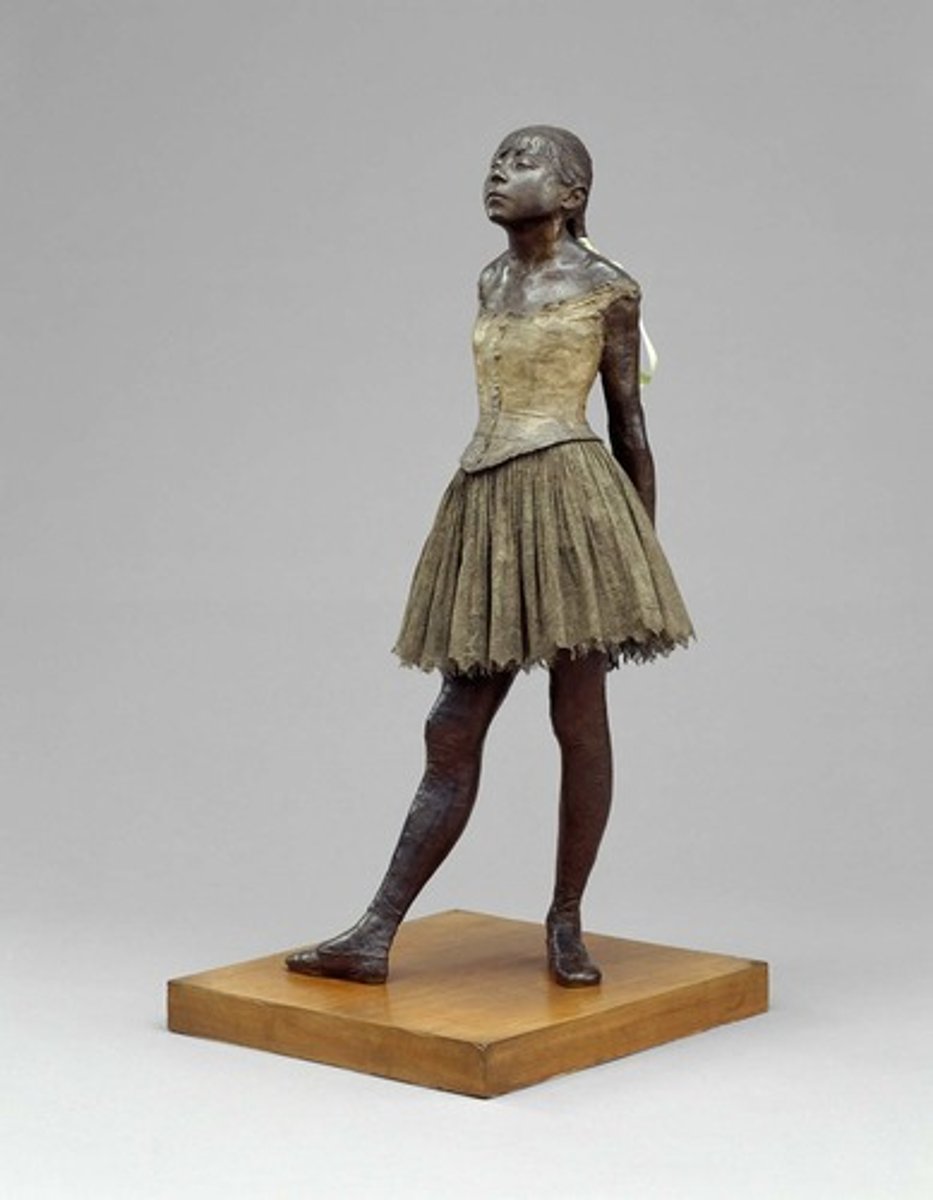
Aguste Rodin
-revealed inner life of humans through gestures and attitudes of the body
-WORKS: the Kiss, age of Bronze, Gates of Hell
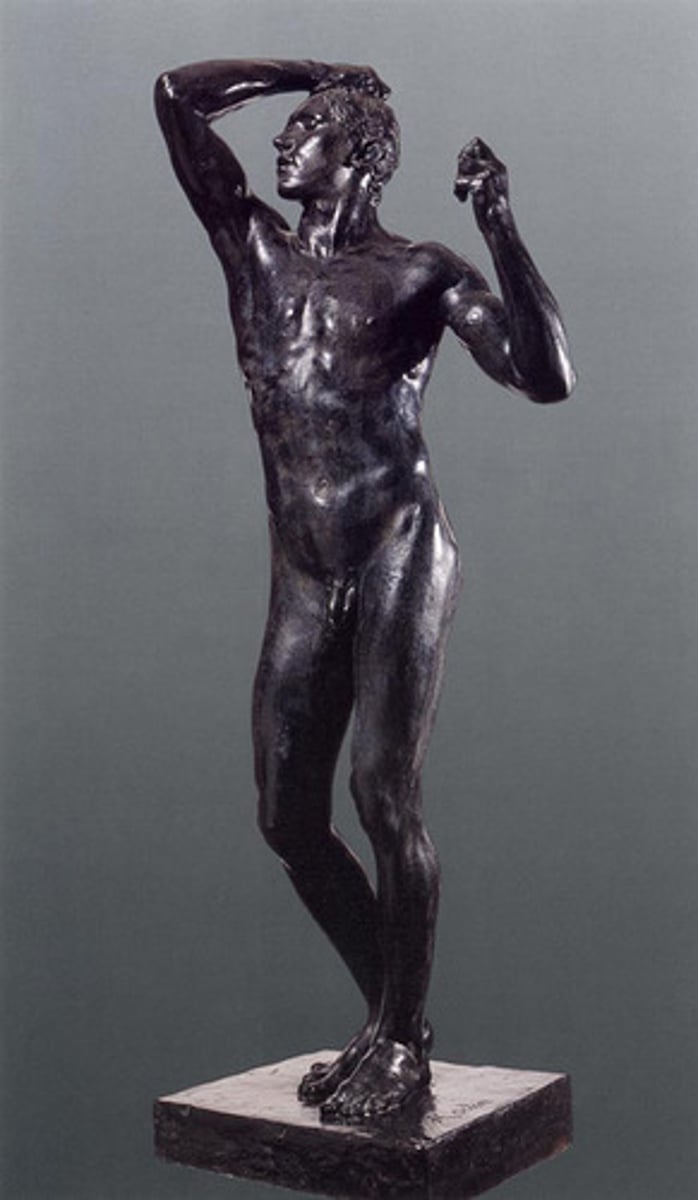
Pablo Picasso
revolutionized sculpture by making constructions by combining disparate objects and materials into one constructed piece of sculpture
WORK: Guitar (made of cardboard)
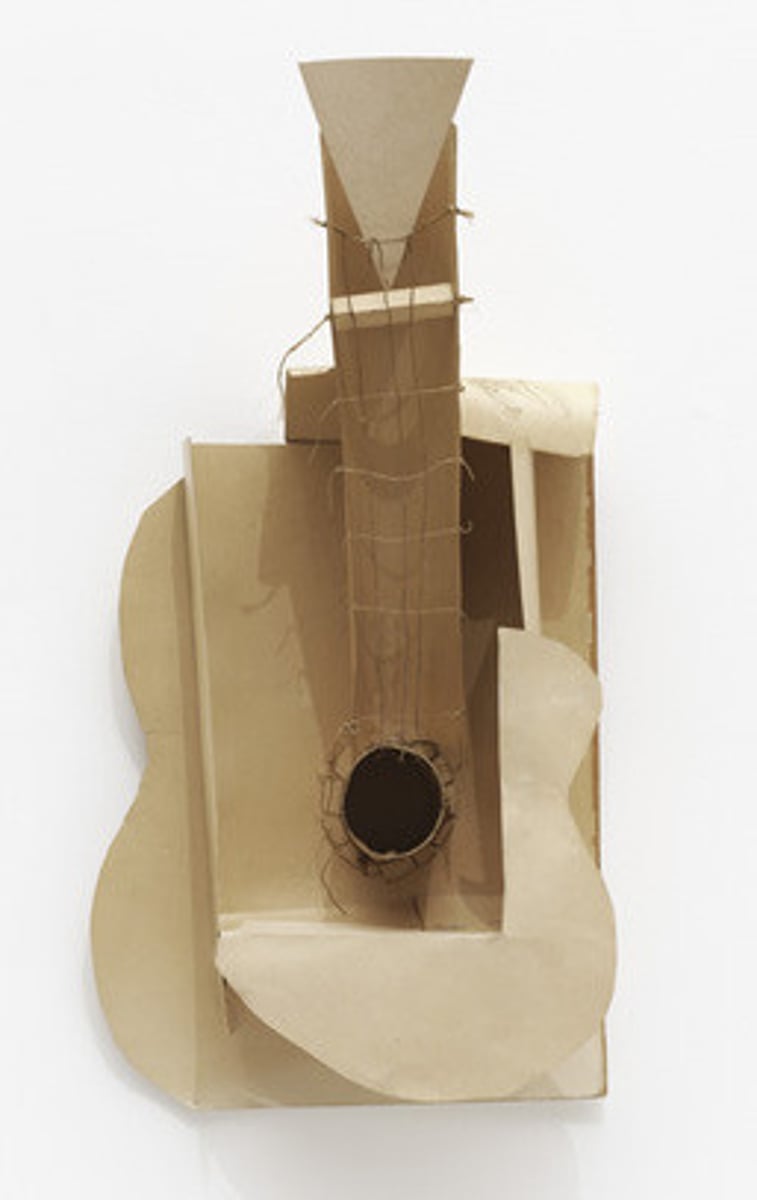
Constantin Brancusi
reduction of forms to their essentials
WORKS: Sleeping muse, The kiss
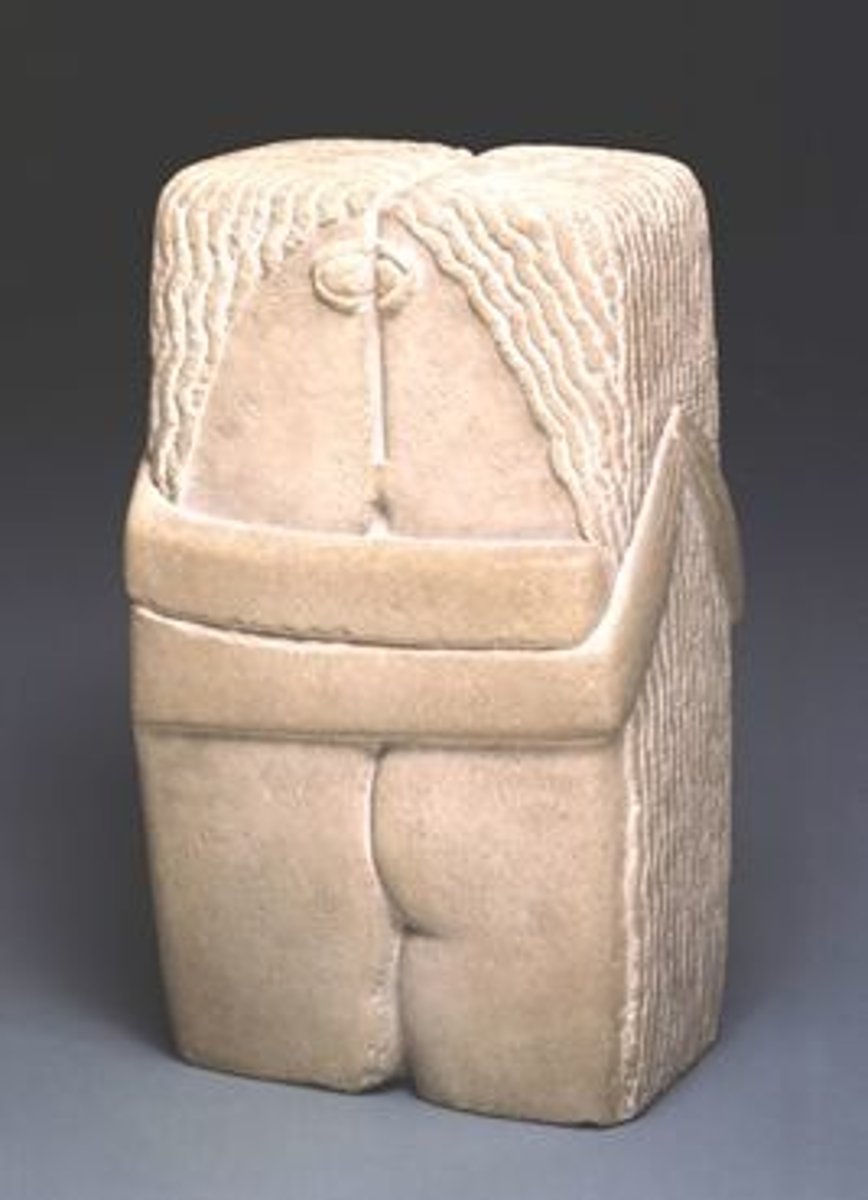
Henry Moore
English sculptor & artist; large bronze abstract sculptures
-won Sculpture Prize, 1948 at Venice
WORK: Mother and child, reclining Figure
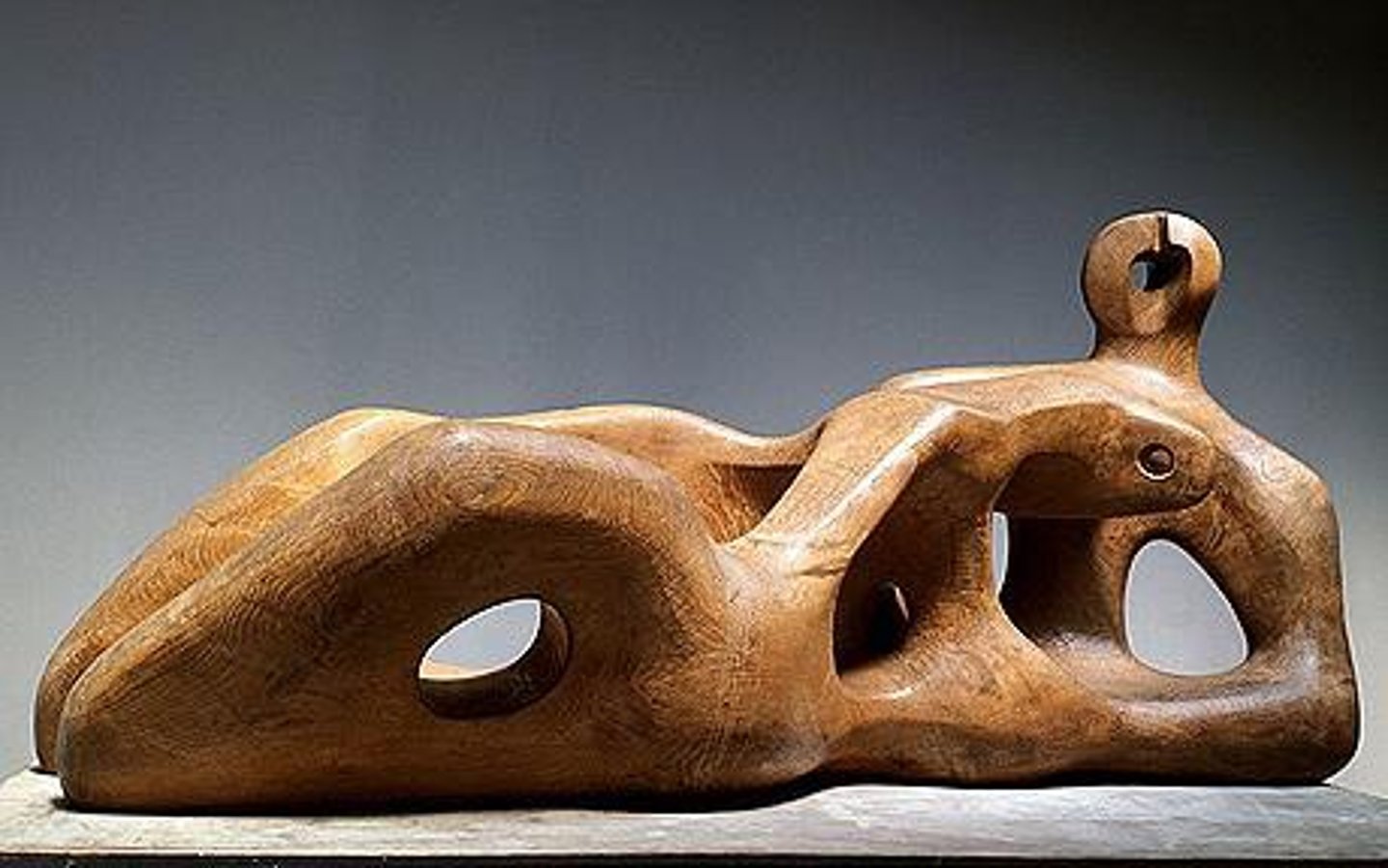
Germaine Richter
Used traditional anatomies and decomposed it in places
WORK: Tauromachy
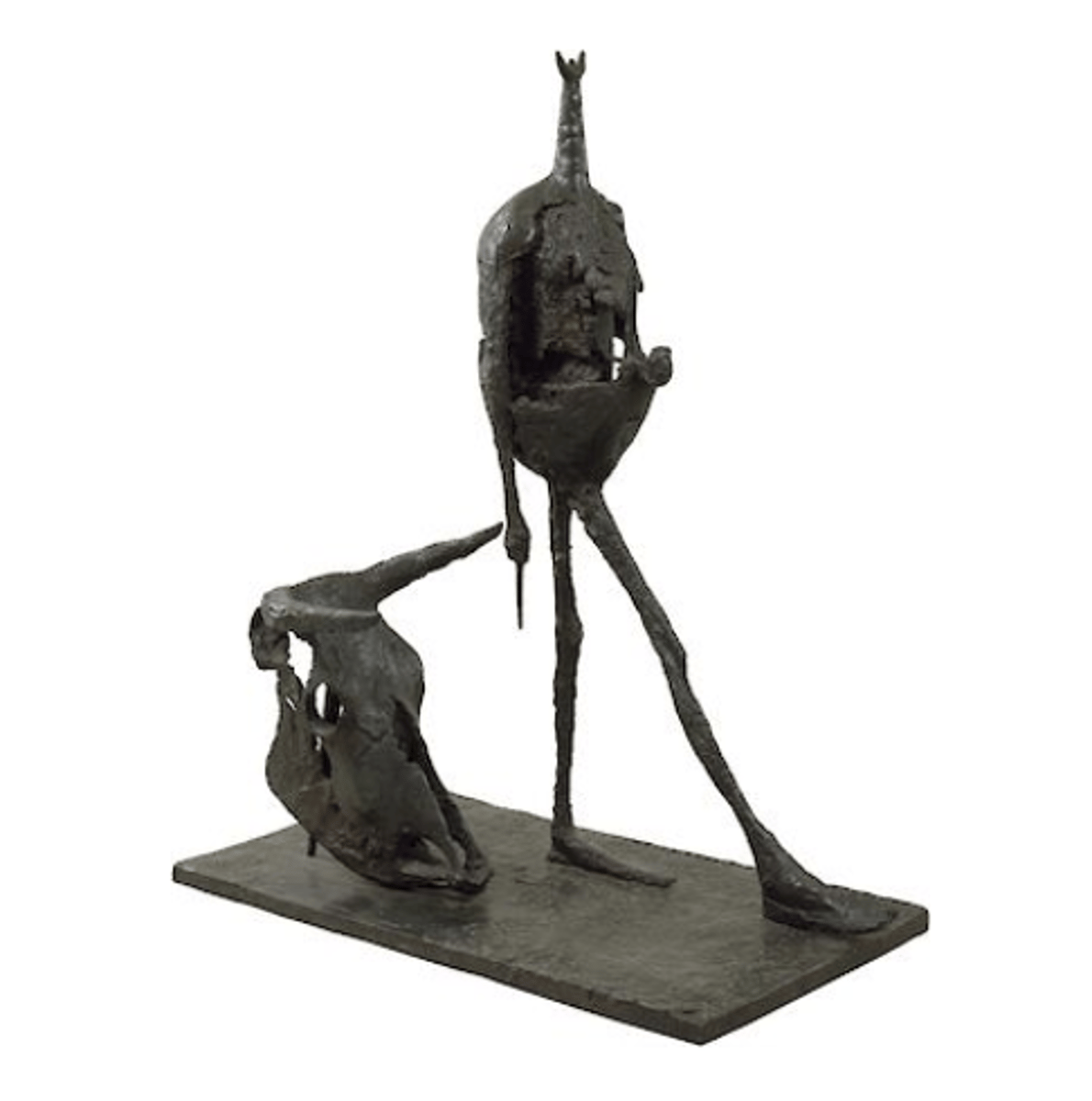
Albert Glacometti
worked on the human figure from life and from memory
WORK: The man pointing
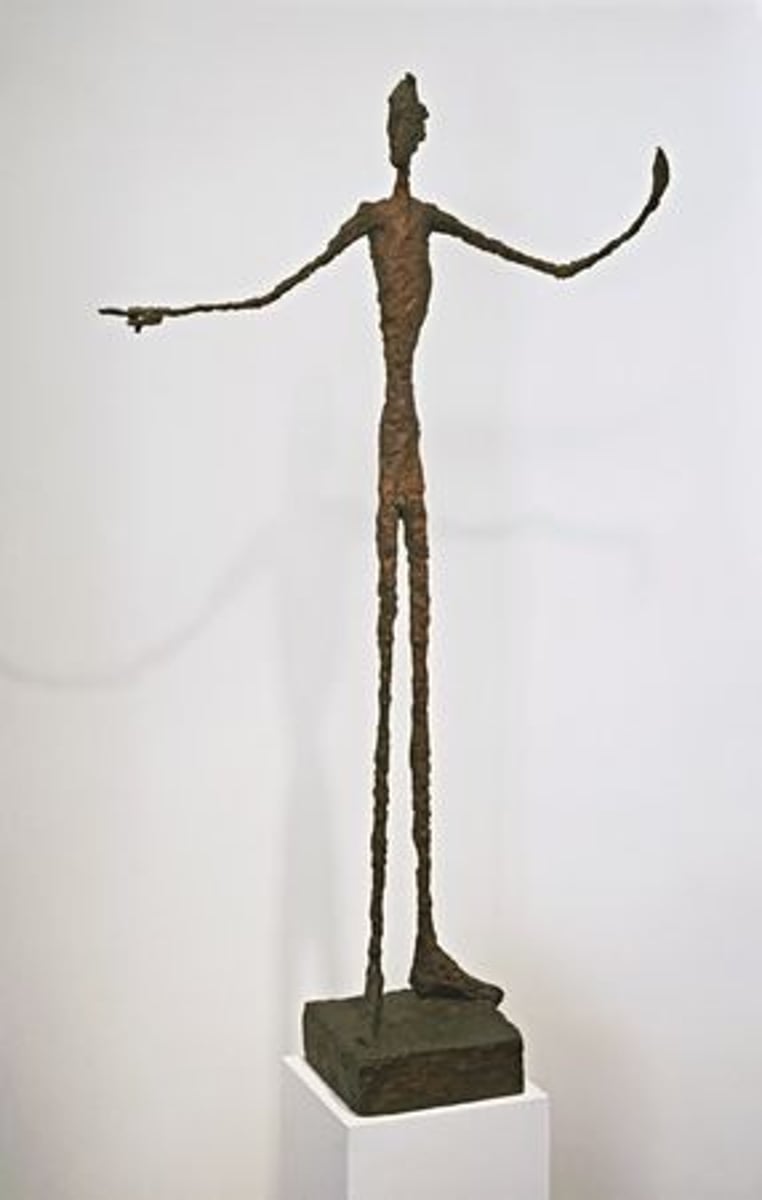
Indian sculpture
(GEOGRAPHY)
sculpture in reference to all things Buddha
WORKS: Kandarya Mahadeva Temple, Shrine of Ellora